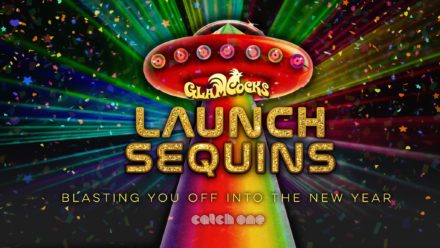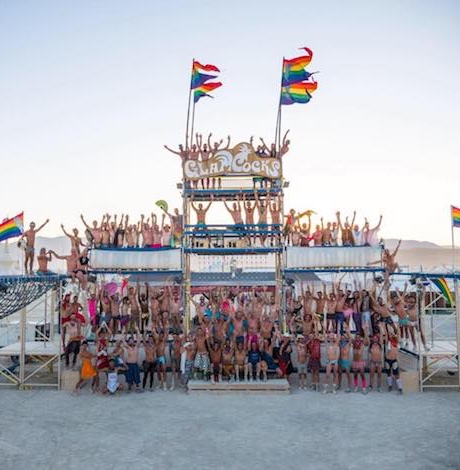a&e features
Utopian Queers of Burning Man
Whatever your brand of an ultimate world, you will find yourself in the desert
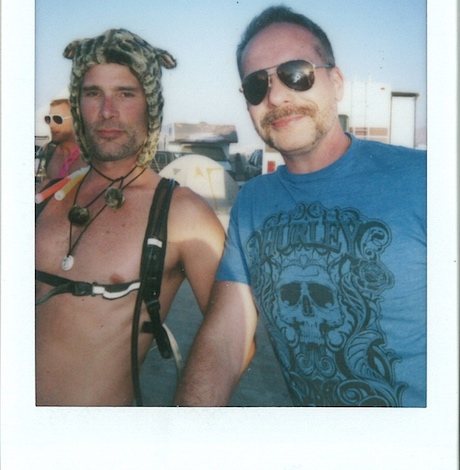
“Most men and women lead lives at the worst so painful, at the best so monotonous, poor and limited that the urge to escape, the longing to transcend themselves if only for a few moments, is and has always been one of the principal appetites of the soul.”
― Aldous Huxley, The Doors of Perception/Heaven and Hell
For many people, hearing the words “Burning Man” conjures up a dusty interlude somewhere in the desert near Black Rock, Nev. And yet, each year, thousands of people from around the world come together to build, live and demolish a diverse town.
Black Rock City is unlike any other place in the world, with employees and citizens who build an exquisite, commerce-free place in just one week.
Whether you are a virgin burner or a veteran, Burning Man is a cathartic, life changing experience. The Los Angeles Blade talked to attendees about their participation.
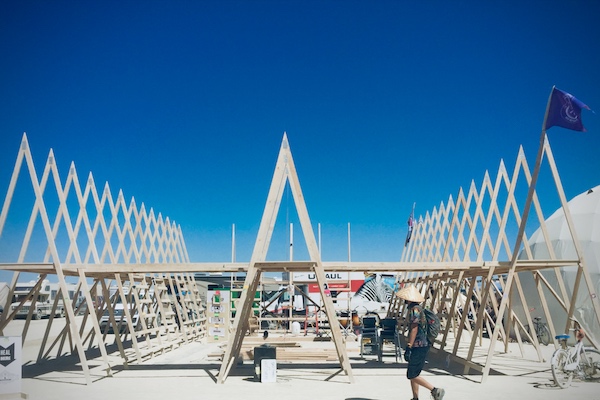
Jose Caballer camp, Node Republik (Photo Courtesy Caballer)
Jose Caballer
“That first burn was a journey of discovery,” reminisced queer-ish graphic design expert Jose Caballer, who co-founded Node Republik, one of the many wildly creative camps with Jesse Grushack.
“I had brought with me pillows, shade, costumes, a little tribal drum, jewelry— all that symbolized where I was in my journey. “That Tuesday on a playa journey, I was gifted the keys to the doors of perception. I accepted and proceeded to take a journey of initiation.”
Where the burlap shade structure Caballer built became a filter for the rays of sunlight, the drum became a bridge to his Caribbean ancestry and taught him how to play.
“And that the center was the fire, the heart and the edges was the conversation, the community. I played with campmates at Mardi Gras as if I was channeling the spirit of Tito Puente. I went to a talk on Sacred Geometry at Red Lighting, to yoga and meditation. I danced, skated, pillow fought and attended a non-sexual nudity workshop that I stumbled on at a physics talk. It was an explosion of new ideas, new ways of being and a world I knew existed but didn’t even know I was looking for.”
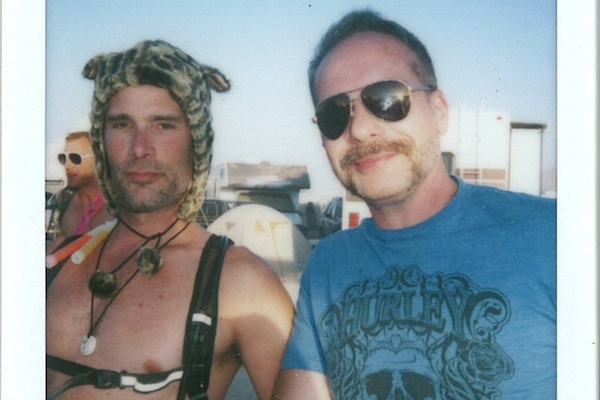
David Jensen (right) Tony Albert (left). (Photo provided by Jensen)
David Jensen
“It’s a challenge just to go,” noted five-time attendee David Jensen, who is part of The Pink Fuzzy Monkeys camp, an art camp with activities every afternoon, like Titty Twister and Homo Hoe Down.
“One plans for months, you don’t just show up! And that’s both a blessing and a challenge.”
Jensen says the queer community is a key element/foundation to Burning Man. “I feel COMPLETELY accepted and supported…it doesn’t matter who you are there, as long as you’re kind, empathetic, and live your life in a non-judgmental and accepting way.”
The queer business entrepreneur is intrigued by this year’s theme: Metamorphosis. “Meta= next chapter. Being that I am about to create my latest startup, it’s the perfect place for me to get inspired.”
Back in 2004, co-founder Larry Harvey wrote the Ten Principles as a guideline for regional groups who meet year-round, which illustrate Burning Man’s values that have evolved since the event first was held.
This is why Jensen has not been happy with the “trustafarians” culture. “These are rich 24 year olds that try to have private camps. All that nonsense is not part of the Principles, which celebrate the communal nature and kindness that abounds.”
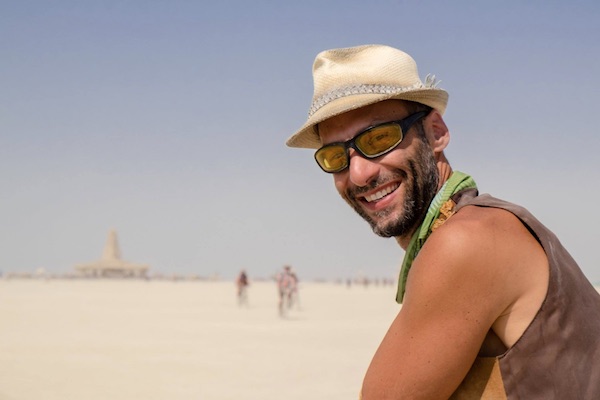
Franco Cefalo. (Photo courtesy Cefalo)
Franco Cefalo
With everyone dressed in flamboyant, colorful and sexy burner wear, finding the Burning Man “Gayborhood” can be a challenge. “Nevertheless, LGBTQ folks are everywhere and pretty indistinguishable from any other burner,” quipped Franco Cefalo, who has attended for 13 years.
Cefalo has stayed at a variety of camps, including The French Quarter, (looks like New Orleans) and Kostume Kult (gives away costumes). “And I’ve run my own camp for a few years. This time, our camp 3DBJ, has a ‘Baywatch’ theme, with two art cars that look like jet skis and one that is a lifeguard stand.”
Cefalo, who has been with men and women, loves visiting the many LGBTQ-themed camps.
“I participate in the Naked Pub Crawl every year, which stops at a number of gay camps along the route. I’m a wrangler, so I have a megaphone to alert people when it’s time to move on to the next pub. It’s fun.”
Every camp has its own flavor and personality. “The sexy-themed camps are obvious, but my favorites are ones like Celestial Bodies, which is a welcoming space for people to gather, regardless of identity or orientation. It’s a lovely, friendly vibe,” Cefalo added.
While the Burning Man experiment is ever changing in pursuit of improvements and inclusiveness, “I can’t imagine what the LGBTQ community would want that is any more inclusive than this place,” emphasized Cefalo. “The one thing I’d like to see more of are women-based camps.”
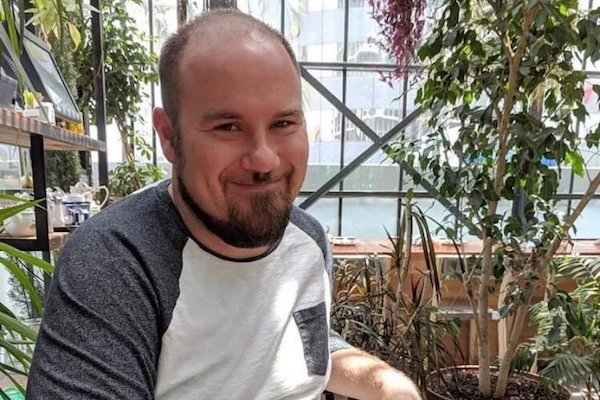
Richard Radiance. (Photo courtesy Radiance)
Richard Radiance
While Richard Radiance loves the Burning Man principle that encourages the individual to discover, exercise and rely on his or her inner resources, he feels the organization could help more people with limited incomes to attend.
“This is a for-profit, beautiful festival with a lovely bunch of subcultures attached to it, and a deeply spiritual history. But even church is a business. So is Burning Man. If I could change anything, I would make it cheaper, and make it easier for broke LGBTQIA kids to get out there. I would trade 20 European millionaires to give a couple of gay boys from South Central an opportunity to take a bike ride on the deep playa.”
Radiance, who is bisexual, took his first experience at camp Wasabi Kisses as an opportunity to try on a new gender expression and identity. “I wore dresses and drag almost the whole week, and used they/them pronouns. My camp was extremely accommodating, and so were many people I met. It help me answer some questions I had about my own masculinity and gender identity.”
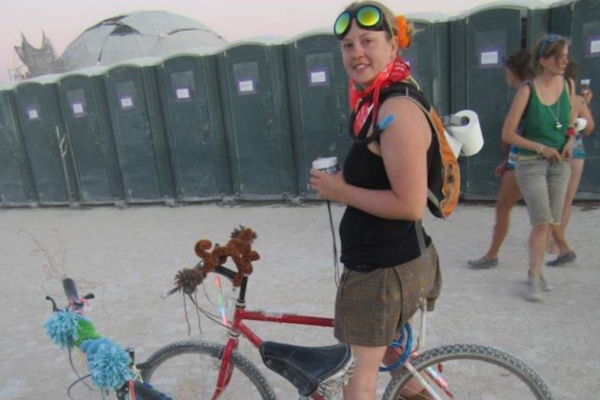
Libby Higgins. (Photo by Higgins)
Libby Higgins
With so much happening at every hour of the day, sometimes it’s a bit hard to find the LGBTQ happenings. Bisexual production coordinator Libby Higgins has been to Burning Man twice, staying with the camps, Whiskey and Dust and Black Rock Bakery.
“While I didn’t search too hard, I found the LGBTQ culture to not be readily evident. My impression was that it seemed to be limited to specific camps, bringing like- minded people. That said, there are so many ‘scenes’ on the playa that it’s impossible to experience them all!” she enthused.
Higgins continued: “Burning Man culture is so inclusive that to me it’s impossible for it to feel exclusionary. But I felt like the visibility just isn’t there. I thought I read the guide closely, but couldn’t recall seeing many LGBTQ-specific events.”
When she comes back again, Higgins would like to see improved accessibility for people of color and improved visibility for LGBTQ people.
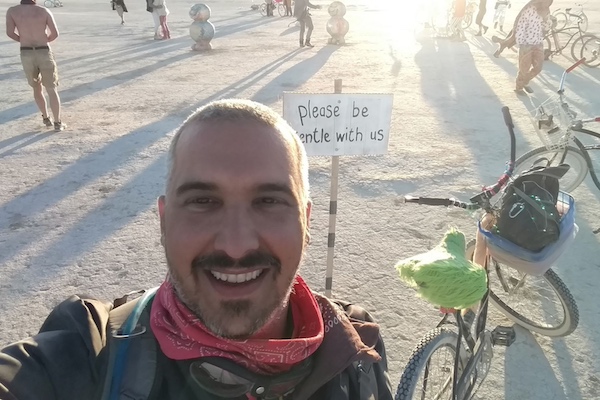
Anthony Drew. (Photo by Drew)
Anthony Drew
Anthony Drew had a “mesmerizing and awe inspiring” experience with his first Burn last year, staying with Poly Paradise, one of the biggest camps, based out of Phoenix.
“It was about 17 years in the making! I felt like I was at an adult playground—you can have fun in so many different ways, be it singing, dancing, roller skating, telling people to fuck off, walking away from a conversation mid sentence and not looking back! These are things you cannot get away with in the default world!”
Drew enjoyed the fact that people were so open and loving there. “I made friends with this giant straight biker dude that I thought was going to kill me but just wanted to greet me with a hug. We had a beer everyday, he was my neighbor. He gave me my playa name, mamabear! It’s fun for so many reasons.”
Drew will definitely be back next year. “While Black Rock City may be de-commodified, getting there is not (tickets, flights, supplies, etc.) so every other year seems reasonable to attend. Besides, no one should have that much fun annually!”
Boots (Playa Name)
This will be Boots’ eighth year at Burning Man. The most special moments she has experienced happened during the building of her camp’s infrastructure.
“Setting up our large goedesic dome, our shade structures, our kitchen, our shower, etc. was amazing. Radical self-reliance and communal effort are two of the principles, and physically building a camp requires and expresses both of those initiatives,” she said.
Boots has felt empowered working with a team of women and non-binary people. “To build that without the assistance of cis-men, who are generally the dominant ones society associates with the ability to do manual labor, is incredible.”
It can be difficult to be at a non-LGBTQ-specific camp the way that it can be difficult to attend your heterosexual cousin’s wedding, where every other guest appears to be heterosexual, acknowledged Boots.
“The experience of being the only queer at a camp can be alienating for some, which is why I think Camp Beaverton provides an important space on the playa. This is a place where queer and non-binary people can come be around other queer women and non-binary folk.”
Boots has never felt unsafe as a result of her sexual orientation or affiliation with Camp Beaverton. “There are many more camps for queer men than there are for queer women in the gayborhood, but this is also consistent with cities outside of burning man, where gay men tend to geographically cluster more than lesbians do.”
Boots would like to see the Burning Man organization increase the number of LGBTQ people at the event, by offering more low-income tickets.
“When folks pass through the gate, they enter a city that utilizes a gift economy,” she noted. “However, getting there requires quite a bit of participating in the capitalist economy. It generally costs thousands of dollars, between the ticket price and all the food and gear it takes to sustain yourself on the playa,” she stated.
“Making the event more affordable to demographics who are screwed over in the default world by the gender/sexuality/racial wage gap, would be immensely helpful.
a&e features
Writing her own story arc: Stuntwoman Ellie Haigh takes on Hollywood
A candid conversation with stuntwoman Ellie Haigh on training arcs, chosen family, and what it means to take up space as a trans woman in Hollywood

If you take a peek back at stuntwoman Ellie Haigh’s pre-career upbringing, you will find a kid geeking out to Power Rangers with an overwhelming sense of possibility. Far before she was doubling actors or choreographing fights, Haigh was already building her training arc through gymnastics, parkour, martial arts, and determination. What started as a childhood appreciation for Ninja Turtles steadily evolved into a career founded on movement with intention.
Moving to Los Angeles in September 2020 (arguably the worst possible moment to set sails for the Hollywood dream), Haigh entered the stunt world with no map, no safety net. As one of – and quite possibly the only – openly trans women working in stunts, Haigh navigated an industry that is both physically exhausting and slow to change. Instead of shrinking herself to fit the mold, Haigh has instead opted for visibility and authenticity. She has quickly learned when to fight, when to teach, and when to simply take space.
In our conversation, Haigh shares on motion, mentorship, and the responsibility of this visibility. She serves on the growing pains of Hollywood and its politics, and why fantasy worlds often tell the truest stories.
What first sparked your enthusiasm and interest in stunt work? Was there a moment when you realized it could be a real career?
I remember as a kid getting into parkour, gymnastics, and martial arts. What sparked that, this is a little embarrassing, was Power Rangers. Watching it as a kid, I remember feeling such intense FOMO. I wanted to be Kimberly, the Pink Ranger, so badly. I used to do everything I could to be her. All my hobbies just ended up relating to that in some way.
I added acting into the mix as well, and it just felt like the right path. I didn’t realize stunt work could actually be a career until I was much older, probably in high school. At that point, all my hobbies were already aligned. After high school, I was coaching gymnastics full-time and realized pretty quickly, this isn’t it. That’s when I decided to move to LA.
Are there skills from coaching gymnastics that translated into stunt work?
Absolutely. I taught gymnastics and parkour for about ten years, mostly to children. There are a lot of aspects of stunts, especially when you’re doubling, where you have to teach actors what you’re doing. Or if you’re part of a stunt team creating choreography or previsualization, you need to be able to explain movement clearly. Coaching made that much easier.
Aside from the Pink Ranger, who were some of your earliest influences?
A lot of them were fictional. Video games, superhero shows, Marvel comics, Spider-Man, Spider-Gwen. Power Rangers, Ninja Turtles. I also loved anime and still do. I remember watching characters train and thinking, “Why am I not in my training arc right now?”
More recently, I’ve been getting into swords, historical European sword work, like in The Lord of the Rings, and Japanese sword styles as well. Anything where movement is intentional and carefully thought out really inspires me.
How has the transition into Hollywood been for you professionally?
I moved to LA about five years ago, in September 2020… horrible timing. It was during COVID, and I didn’t know anyone. I’m originally from the Boston area. During the pandemic, I was furloughed from my coaching job, and it was the first time I had actually saved money. When my lease was up, I just moved.
At first, I didn’t know where to go or who to talk to. I found gyms where stunt people train, and I just showed up and trained. Over time, I made friends and built a community. Once things started opening up, I felt like momentum was building, and then the strikes happened.
Even then, I didn’t regret moving. I always planned to stick it out. Getting my foot in the door was hard, but it came down to being in the right places, building community, and being a good person. The right people eventually find you.
How has your trans identity influenced your experience in Hollywood? Have you seen the industry evolve?
My trans identity has definitely affected my work. As far as I know, I’m the only trans woman working in stunts in LA right now. There’s no blueprint for how to navigate this space as a trans woman, especially because stunt is still a pretty conservative industry overall.
Early on, I tried to be someone I wasn’t to fit in. I thought I needed to tone myself down or be more “bro-y.” It made me really unhappy, and it didn’t even help professionally. At the end of the day, I was still trans, so I had to ask myself, Who am I even doing this for?
A few years ago, I decided to be fully myself and trust that the right people would find me. That’s when I met my mentor, Jess Harbeck, a trans man and stunt coordinator. He helped me navigate the industry, got me my SAG card, and gave me my first doubling job. More importantly, he showed me that there is space for me here.
How is the current political climate – anti-trans, anti-queer, anti-anything loving and accepting – affecting you personally or professionally?
It’s infuriating, honestly. I speak out a lot online and lose followers because of it, often other stunt people. At this point, I don’t care. If someone followed me for years and that’s what made them unfollow, they were here too long anyway.
I try to stay informed while also protecting my mental health. Doom-scrolling doesn’t help anyone. I think of joy as a form of protest, choosing to live fully while still speaking out and supporting my community.
How do you balance care for the community with self-care? Do you feel a responsibility to represent the trans community?
I’m a stuntwoman who happens to be trans, and I’m more than just my trans identity. But representation matters, especially right now.
When I was a gymnastics coach, I was often the first trans person my students had ever met. Years later, many of them are outspoken supporters of trans rights. I don’t know how much credit I deserve, but I know visibility matters. People might see that I’m trans first—but then they see that I’m good at what I do, and that matters.
Do you see yourself mentoring others in the future?
Absolutely. I didn’t quit coaching because I disliked it. I quit because I needed to put all my energy into stunts. Teaching still comes up constantly in my work, and I’d love to mentor younger performers someday, especially trans women. Right now, I still have a lot to learn, but I want to be able to give others what my mentor gave me.
What’s been one of your most challenging or meaningful projects so far?
One of the most challenging experiences was working on Marvel’s The Punisher. It wasn’t physically difficult, but the logistics were exhausting, flying back and forth between LA and New York, dealing with delays and schedule changes. It taught me a lot about flexibility and endurance.
One of my favorite experiences was doubling Hunter Schafer on a short film/commercial project. I’d admired her for years, so getting to work with her was surreal. The set had such a great vibe, and it felt like a moment where I thought, This is exactly why I’m doing this.
If you could pitch your own action or fantasy film, what would it be?
I think it would be incredible to see a trans woman as a lead action star. I think it’s super important that trans women are shown that not only are we allowed to lead, but we can also be seen as strong and powerful. Strong is femme and I can’t wait to see that.
Where do you see yourself in five years?
I see myself still here, still creating. I want to be a stuntwoman, an actress, and a creator. I want to do action comedies, high fantasy, sword work, and projects I believe in. I don’t know exactly what it’ll look like yet, but I know I’ll be there.
a&e features
Vic Michaelis is a very important person
The ‘Ponies’ and ‘Very Important People’ star discusses what it’s like to make history (and great TV) as a non-binary performer today.

What does queer representation look like in 2026? It’s a complicated question, with a shockingly hopeful answer.
Harmful LGBTQ+ stereotypes have plagued mainstream media for decades, with only recent years offering big-budget projects exploring the nuances of marginalized identity. But even with this progress, the past year has left countless of these projects cancelled or delayed, with queer creatives and their stories becoming political fodder for bigots nationwide. Despite this, LGBTQ+ storytellers have persisted, continuing to tell their stories while creating new opportunities for other artists to thrive. It’s heartening to see so many queer storytellers doing this in the modern day, and it’s why Vic Michaelis’ historic filmography is more important now than ever.
A Canadian transplant, this non-binary performer arrived in LA one decade ago and took the city’s improv scene by storm. Eventually going from sketch comic to television host — though they still perform in improv clubs across LA — Michaelis has revolutionized talk shows and gained a massive following with their popular Dropout program, Very Important People. Not only that, but Vic’s newest role alongside Emilia Clarke and Haley Lu Richardson in the tense spy thriller, Ponies, means that the artist will be introduced to a bigger audience than they’ve encountered before. Theirs is a wonderfully chaotic career that keeps the performer very busy, but Michaelis still managed to sit down with the LA Blade to discuss these roles, what these projects mean to them, and how it feels to do all of this as an openly queer creative today.
“It’s so funny because it’s true, I am a talk show host…I am Vic Michaelis, and I am hosting a talk show, that is a true thing you are saying” Replied Michaelis, when learning that they’ve made history by becoming the first non-binary person to host a talk show. “All to say, it’s an honor!” Going into its third season, Very Important People perfectly matches its creators’ chaotic style of comedy. Each episode sees a different comedian get decked out in a random costume (ranging from gorgeous gowns to full hotdog prosthetics) and adopt a whole new persona for a sit-down interview with the star. It’s an irreverent premise that host and guest dive into wholeheartedly, with the performer stressing how this project mainly serves as a way to uplift the LA-based performers they know and love.
“The improv scene in LA is very tight-knit,” Michaelis explained. “And we get to see versions of these performers that we don’t [ever] get to see [onstage]. The best part of the show is watching [these people], my friends, shine in the spotlight.”
It’s this camaraderie — which has introduced audiences to numerous LGBTQ+ performers they wouldn’t have known otherwise — that has earned Very Important People widespread acclaim and garnered Michaelis thousands of fans online. And with them acting as a version of themself on the show, many watchers assumed they knew what to expect from the comedian…which is why Michaelis is so excited to shock them all with their total metamorphosis in Ponies.
While Vic is used to turning performers into monsters and aliens, their Ponies transformation sees them go from the bombastic host fans love into Cheryl: the no-nonsense, endlessly antagonistic office manager. The main foil of Ponies’ central protagonists (Clarke and Richardson), the series follows this trio as they maneuver around an American embassy in 1970s Russia. With our main duo acting as spies trying to master lethal espionage, they’re constantly forced to put up with Michaelis’ needling Cheryl…who just always happens to know more about their covert missions than she should.
“I personally have a lot of empathy for Cheryl,” gushed Vic, while detailing how it was to play such an intriguing character. “Especially in that time period! If she had been born a man, that would have been it. She is competent and capable, and would have risen far past the station that she’s in [when we meet her].” While initially presented as a one-dimensional nag, each Ponies episode dives deeper into this character; it teases not only the many skills she gave up for the sake of her husband, but just how far Cheryl will go to embrace the talents she’s been forced to hide away. And as a performer who’s made an entire talk show about bringing out the best in any kind of character, she offers a perfect avenue for Vic to show off their distinct acting style to a whole new audience on Peacock.
Cheryl gave Michaelis a chance to act in ways their fans have never seen before. But beyond that, Vic also recognizes a different significance to this role: the fact that it means thousands of new viewers will get to watch a queer person onscreen on a major network.
They detailed how they weren’t always as proudly authentic as they are now. Early in their career, Michaelis was faced with a choice: be openly non-binary, or masquerade as cisgender in an industry still riddled with biased casting directors. Quickly, and with the support of their fellow LA creatives, Vic realized not only how much their identity could mean to themself, but to so many others. “Especially being in a field that’s very dominated by cisgender white men…the representation is so important,” they explained. “And if it helps one person, then it’s been worth it. If one person feels seen, then you know it’s worth it.”
It has certainly proven itself to be worth it, as with this new role, Michaelis holds the honor of being one of the few gender-expansive performers to ever appear on a major network. And while proud of the tireless work it took to get them here, as the interview wound down, Vic made sure to shout out the many other LGBTQ+ performers creating and starring in shows across LA today. “There are a lot of incredible gender queer folks doing absolutely amazing things on the scene right now – but there’s always room for more.”
Michaelis encouraged anyone inspired by their work as an openly non-binary performer to try to find that confidence in themselves. To use their roles in Very Important People and Ponies as evidence that, no matter how much LGBTQ+ representation is attacked, remember that LGBTQ+ artists will never stop telling their stories to those who need it most. “There’s a lot of really, truly horrible, terrible anti-trans bills and anti-LGBTQ bills coming through,” said Vic. “It’s truly horrific, and it’s really scary…and I’m very proud and happy to stand with our community. [And] it really does feel like it’s not just me standing up. I get to be a part of this big chorus, standing up [for what’s right]. And it’s an honor.”
It’s an important reminder that the fight for representation is never one done in solitude. And, as Vic Michaelis is showing in their every role, it’s a fight that is only truly possible when done with and for your community…all while trying on as many costumes as possible, of course.
a&e features
‘The Golden Girls’ writer Stan Zimmerman reflects on 40th anniversary, coming out, and working with Roseanne Barr
Zimmerman co-wrote the infamous Season 6 Roseanne episode Don’t Ask, Don’t Tell, which prompted controversy at ABC simply for featuring a same-sex kiss
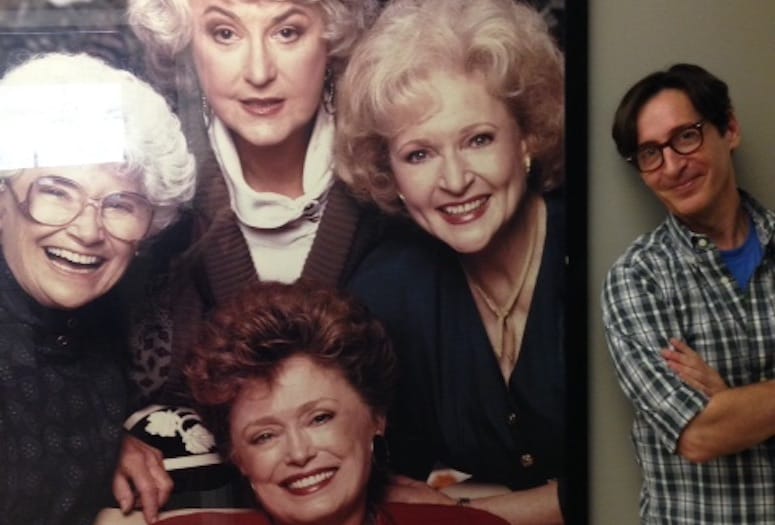
The Golden Girls, one of the most beloved sitcoms of all time, quickly resonated with the LGBTQ+ community due to its stars Betty White, Estelle Getty, Rue McClanahan, and Bea Arthur. But in 1985, when Season 1 began airing, the environment surrounding the making of the show wasn’t so supportive for its gay writers, who started on staff without being out to their co-workers. Stan Zimmerman and his writing partner, James Berg, decided to open up in a local paper.
“Our representatives thought it was a bad idea, but it was a relief for us to finally come out,” Zimmerman tells The Blade. “It’s hard to go to work and be yourself, especially in a job where you have to open your heart and mind and be open to talking about things that you were going through to then create episodes around. Imagine going to work, and you can’t divulge anything. How can you really bring your best talents to the table?”
Starting out the new year, Zimmerman reflects on the show’s 40th anniversary and continued impact. The Blade spoke with Zimmerman about his experience coming out while working on Season 1 of The Golden Girls, dining with Estelle Getty, and writing on Roseanne — notably the Season 6 episode Don’t Ask, Don’t Tell that featured a kiss between two women and prompted outrage from the network. (This interview has been edited and condensed.)
As people have celebrated The Golden Girls turning 40 in 2025, what’s on your mind as you look back?
Of course, tons of memories. But talking about the 40th anniversary, when going into a career, I just wanted a job. And then pretty early on, I landed on the first season of The Golden Girls, and that was more than a job — it changed my life. At the time, you don’t think you’re gonna be talking about it forty years from now, especially when you’re super young like I was. You just want to be able to buy food and pay for living. Then you see that show go through so many renaissances and see new audiences come to it. You know, that first wave was, “Wait, you’re too young to have watched the show. How do you know about it?” And then these waves kept coming and coming. But I feel like right now, this is the biggest wave ever. The show is more popular today than it was back then, and you just see so many generations of people enjoying it and so many age groups. I’ve been involved in television for a long time, and luckily, been involved in a number of big hit shows, yet the thought that one show could attract young kids all the way to older people is pretty wild. With most shows, you only aim for a certain demo.
I have luckily heard so many beautiful stories, especially of LGBTQ+ members sharing their Golden Girls viewings with grandparents. It was such a great way to bond and laugh, and also touch upon a lot of subjects that you probably would not bring up at the dinner table. You’re laughing with them, or you’re seeing characters come out of the closet, and you’re watching these older characters in the show work through them, realizing how important these family members and friends are in their lives.
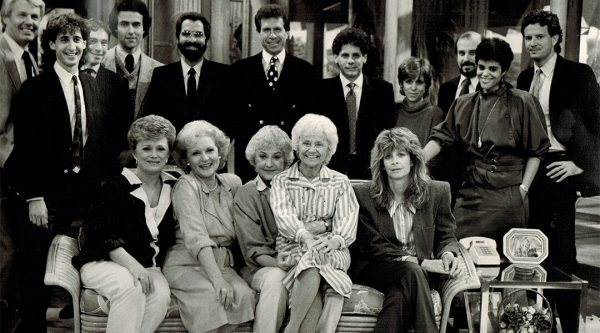
The path to getting into a writers’ room back in 1985 must’ve been so different than what it’s like starting out now. How did you get your foot in the door with a staff job on The Golden Girls?
It’s so funny that you would use the phrase “Foot in the door.” My grandmother must be speaking through you because she always said to me, “Just get your foot through the door, Stanley!” This was after Golden Girls, and I said, “I think my foot’s in the door, I’m trying to shove the rest of my body in.” Obviously, when I started out, there were nights that were just four sitcoms in a row on one network. And for many years, we would have multiple offers to go on a TV series. Now, we’re lucky if there are two or three comedies. There were just more places for us to learn. I’ve always said that Golden Girls was like our college writing 101 classes — how do you write a TV comedy? We were also doing 22-24 episodes a season, so that repetition of learning structure was so fundamental to my growth as a TV writer. Today, writers are lucky if they do six episodes a season. We did a sitcom that we created called Rita Rocks. We did 40 episodes. Then, it was two seasons, and it was OK, a middling success. But if you did 40 episodes of a show now, that would be huge.
You see a few shows now, like Abbott Elementary, that have big season orders and return yearly. But now everything’s a limited series, six or eight episodes. You just don’t get to spend as much time with the characters, which is part of what we love about TV.
And as a writer, we love it because you really get to explore all the different facets of characters and paint them into corners and see how they get out of it. That was really exciting. But also the flip side of that is that at the end of the season, you were exhausted. You had a table read on Monday, and you were filming it on Friday, come hell or high water. You stayed as late as it took.
I gave up a lot of my personal life to work on TV shows. Sometimes, as we get older, we question what could have been, but I loved every moment of it, even the ones that were a little more challenging, like being on Roseanne and dealing with her, and delving into so many interesting storylines. Especially the lesbian kiss episode, which we wrote.
People think of Golden Girls as a very progressive show with a big queer audience, yet, especially in that first season, I know being gay was taboo in the industry. When do you think studio execs started realizing how much the show was resonating with queer people?
I remember going through West Hollywood on a Saturday night when the show was on, and there’d be nobody on the street because they were all in the bars, watching the show on monitors. And I will have to admit, occasionally, I would drop the Golden Girls credit to see if I could get a free martini — that might have worked here and there. But years later, I’d go to gay bars and still see clips of my shows or just meet LGBTQ+ people who knew every word of the scripts. That was really fascinating that it resonated with the audience so much.
And I got to know Estelle Getty, who played Harvey Fierstein’s mother on Broadway in Torch Song Trilogy. She was very friendly with the gay community and would invite me out to dinner, and I got very excited. There’d be 20 gay men, all actors from different companies of Torch Song. She just felt very comfortable being in the company of a gay man.
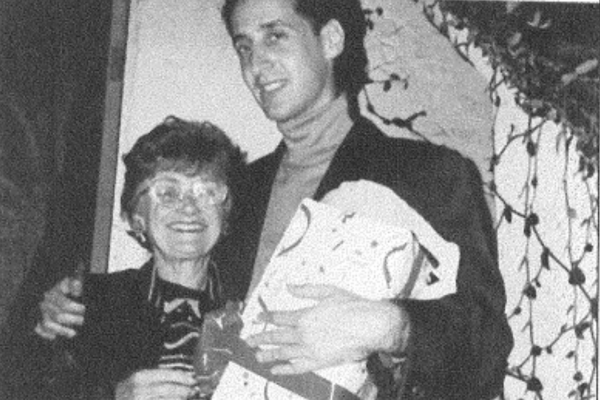
After you came out as gay in the ‘80s, there was a lot of press attention. What was your experience with that?
Back then, it was a big deal if you came out. Obviously, we weren’t household names or actors whose faces were on cameras — those people had to come out on magazine covers. Many of my friends who were actors who were gay or lesbian had to come out in their own way, or else a lot of the tabloids were going to out them anyway. So we got to pick when we wanted to come out, and it was an article in a local paper.
It was a relief, but then for a while, it just opened up the discussions to those writers’ rooms, who were mostly male writers. They just had a zillion questions, all day long. They’d be asking us gay questions, and we’d be like, “Can we write the show and not talk about something gay?” Or we would be at Paramount in an office, and there’d be a window, and a beautiful girl would walk by. The writers would go, “Nothing?” and we’re like, “No.” And then when a hot guy walked by, we’d go to them, “Nothing?” So it got some lively discussions going in the room, which was cool that we got to share that and open up a lot of minds and hearts. Then, turning to a show like Roseanne, Tom Arnold would be running up and down the halls yelling, “Where are my gay guys?” — meaning James Berg and me. And we just kept thinking, “Oh, my God, you can’t say that out loud.” Today, there’d obviously be a lawsuit if you said that.
I wanted to ask you about Roseanne, specifically the Don’t Ask, Don’t Tell episode in Season 6. The network threatened not to air the episode. What was your experience writing that episode and then facing the industry’s reaction?
We knew it would be an interesting episode because Roseanne Barr, on the show and in real life back then, was very open and liberal. So we thought about what story we could give her where we questioned that. If she got kissed by a woman, was she comfortable with that? How did people in her life react? We had no idea that the network would balk at that because it was just a nanosecond of a kiss. ABC flat out said, “We’re not going to let you film it.” Why? What did they think would happen?
You look at the parallels to today. Why do we not want drag queens reading children’s books to kids? Back then, were they afraid that if they saw two women kiss that every woman would turn into a lesbian? It’s so preposterous when you really think about it. We watched a lot of straight entertainment growing up. Did we turn out straight? It’s really about changing their minds and getting people to wake up to what the reality is. There always was and always will be LGBTQ+ people in our society. The sooner we embrace that, I think our society can start to move forward.
You talked about your experience in the writers’ room on The Golden Girls. What was your experience writing on Roseanne, and how was it different?
Golden Girls was terrifying because it was a small writers’ room, but we knew we were writing for four of the best actresses on TV of all time. So there was that pressure. And when the ratings started exploding, I think NBC and the producers knew that they had a piece of gold they had to hold on to. So they were very careful to make sure that every word that went down on set was brilliant. With Roseanne, she had 21 writers on staff, so Tom Arnold and Roseanne Barr, who were married at the time, would bring in their stand-up comedy friends like Norm Macdonald, who had not written for TV at all. We kind of had to teach them how to write for television. Some of those rooms were very intimidating because they were stand-up comedy people who just opened their mouths and were [naturally] funny.
Some rooms I felt really comfortable in and could talk. In other rooms, I just felt so quiet and afraid to speak. Then there was a lot of dysfunction on set when we would have to go down there. Roseanne Barr just created this work environment of fear because we were told, “If she sees the whites of your eyes, you might get fired. So just stand behind the tallest person.” Then, of course, we go and write this lesbian kiss episode. She wanted to know who the hell wrote that, and suddenly, we were thrown at her. But luckily, she just loved it and fought for it. Tom and her got it on ABC, and I will always be thankful to them for that, no matter what her politics are now.
Earlier, we talked about fewer comedies airing on TV in this changing landscape. Across the years you’ve worked in comedy, what have you noticed about the evolution of the sitcom and why there are so few today?
There’s more opportunity in streaming to have really interesting comedies. It’s old now, but I really like a show like Girls by Lena Dunham. But as far as network television, they completely dropped the ball. They got so nervous about offending anybody or taking chances that they became so safe and stale with regurgitated jokes. I would watch or attempt to watch new sitcoms, and it felt like they were using the same writers, and the writers were using the same jokes, and the set-ups for the shows were just the same. When they saw audiences fleeing to streaming, they should’ve taken that opportunity and trusted writers of all ages. There’s no way to predict whether a show is going to be a hit or not — you can do all the testing.
Networks were and are still very afraid of any LGBTQ+ content. We wrote a show on spec called Skirtchasers about a father and his lesbian daughter who both chased women and cheated on those women. Everybody loved the script and had never heard anything like it before, but we were told, “We already have our one gay show this season.”
In recent memory, what are some queer shows or films that you think have done an excellent job with representation? Or just any queer creators or writers you’ve been impressed by.
Actually, last night I watched that Heated Rivalry. It is so freakin’ hot, and it’s so subtle and interesting. I kept thinking I’d be bored, but I just like the pace of it. The actors are good, and it’s obviously very sexy. Then you have the gay sensibility for something like The Gilded Age, which is not a comedy, but I just love the cast. It’s the straightest gayest cast ever! It’s a Broadway wet dream. The show is also produced and directed by Michael Engler, a very good friend of mine who I went to NYU with. I asked him to direct the first play I wrote. I’m so proud watching that show and seeing the twists and turns it’s taking. The White Lotus is a phenomenon on its own, so I do love that. Hacks is really fun — I mean, anything Jean Smart does. We were lucky to have her in the first Brady Bunch Movie.
You mentioned your first play, and most recently, you’ve been working in theater and doing advocacy work. What inspired that?
Especially after COVID, I just love the idea of being in the theater with live people having this experience that is so unique to that one performance — it will never, ever be the same. Luckily, my TV career has enabled me to be able to go off and do theater. I created the play Right Before I Go, which is my suicide awareness play, using real suicide notes and also telling the story of a very close friend of mine who died by suicide 15 years ago. I’ve been traveling the United States with it, and made my off-Broadway acting and playwriting debut this past September, which was Suicide Prevention Month. It had a lot of queer actors in it: Wilson Cruz, Maulik Pancholy, Danny Pintauro, and then gay icons like Wendy Malik from Hot in Cleveland and Christine Taylor from The Brady Bunch Movie. That was really impactful, and I feel needed. In New York, audiences kept saying during our talkback that there’s no other theater like this that gives you a safe space to watch a show like this and then talk about it with a local mental health professional on stage.
When you get involved in projects, it takes so much of your life. I want to go out and either make people laugh, cry, but be moved. And that’s very exciting to sit in the theater and realize they’re having these emotions because of something that I created.
a&e features
Looking back at the 10 biggest A&E stories of 2025
‘Wicked,’ Lady Gaga’s new era, ‘Sexy’ Bailey and more
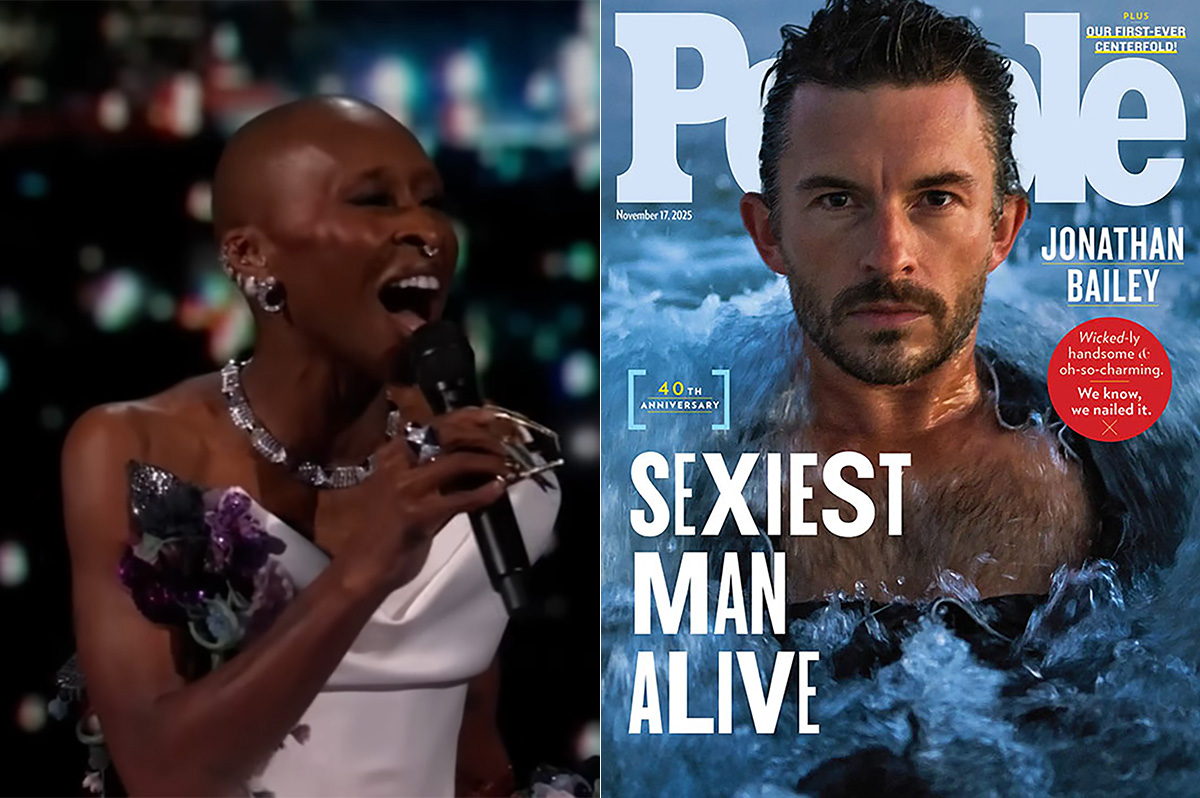
Although 2025 was a year marked by countless attacks on trans rights and political setbacks, the year also saw brilliant queer artists continuing to create art. From Cannes and Sundance Award winners now vying for Oscar consideration to pop icons entering new stages of their careers, queer people persevered to tell their stories through different media.
With the state of the world so uncertain, perhaps there’s no more vital time to celebrate our wins, as seen through some of this year’s top pop culture moments. While there’s no collection of 10 stories that fully encompass “the most important” news, here are some events that got the gays going:
10. ‘Mysterious Gaze of the Flamingo’ wins big at Cannes
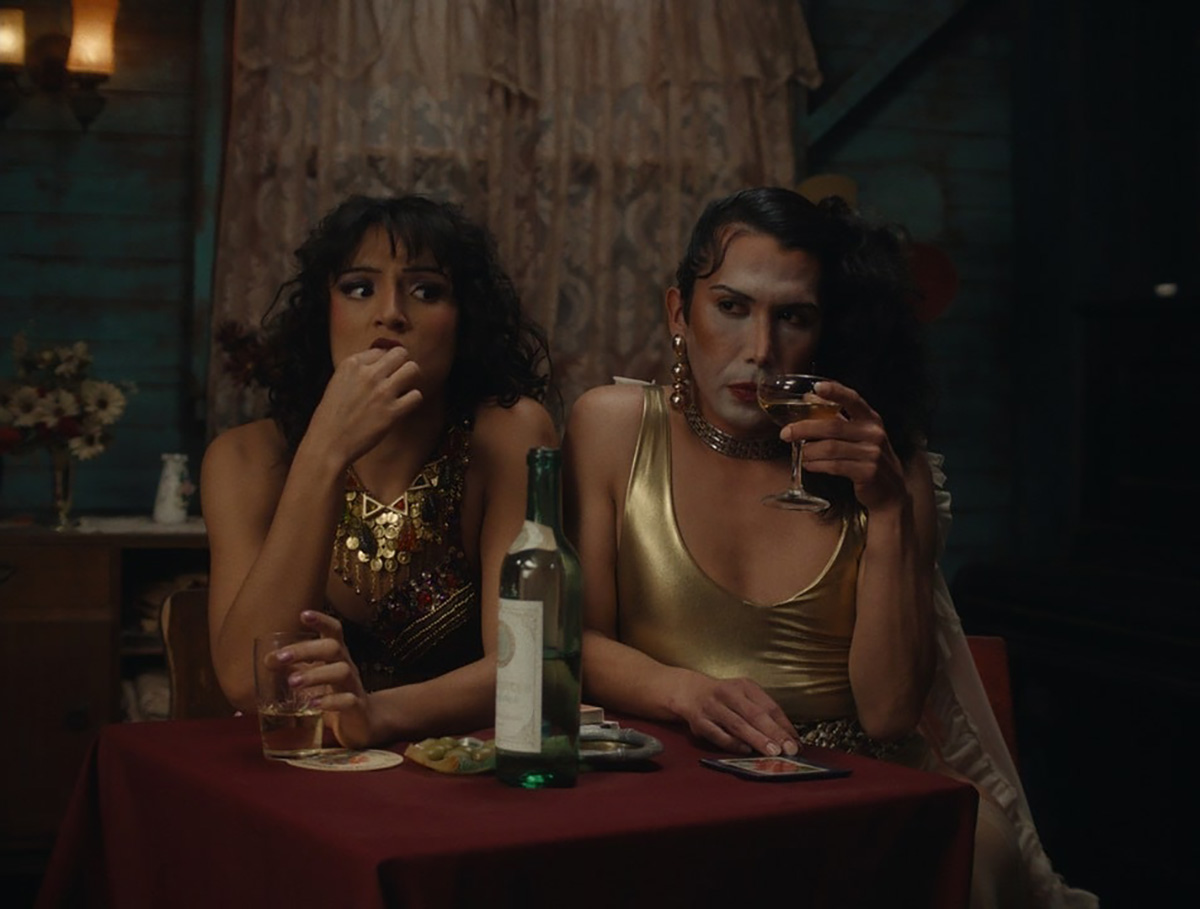
The Cannes Film Festival has become a crucial start for films hoping to make their way to the Oscars, and first-time director Diego Céspedes won the top Un Certain Regard prize for his intimate western “The Mysterious Gaze of the Flamingo.” The film is set in the ‘80s and is intended as an allegory for the AIDS epidemic. Seeing a film that unpacks vital queer history win one of the most coveted awards at Cannes has been a huge point of pride in the independent filmmaking community.
Since the film bowed at Cannes, it has been selected as Chile’s Oscar entry in the Best International Feature race. Speaking with The Blade during the film’s AFI Fest run in October, Céspedes said: At first, I was kind of scared to have this campaign position in the times that we’re living [in] here. But at the same time, I think the Oscars mean a huge platform — a huge platform for art and politics.”
9. ‘The Last of Us’ returns for an even gayer season 2
While the first season of The Last of Us gave us one of TV’s most heartbreaking queer love stories in the episode “Long, Long Time,” Season 2 doubled down on its commitment to queer storytelling with the blossoming relationship between Ellie (Bella Ramsey) and Dina (Isabela Merced). The show expanded on the pair’s relationship in the original video game, making it perhaps the central dynamic to the entire season. That unfortunately came with more homophobic backlash on the internet, but those who checked out all the episodes saw a tender relationship form amid the show’s post-apocalyptic, often violent backdrop. For their performance, Ramsey was once again nominated for an Emmy, but Merced deserved just as much awards attention.
8. ‘Emilia Pérez’ sparks controversy
Jacques Audiard’s genre-bending trans musical “Emilia Pérez” proved to be an awards season juggernaut this time last year, winning the Golden Globe for Best Musical/Comedy. But when the lead star Karla Sofia Gascón’s racist, sexist, and homophobic old tweets resurfaced, the film’s Oscar campaign became a tough sell, especially after Netflix had tried so hard to sell Emilia Pérez as the “progressive” film to vote for. Mind you, the film had already received significant backlash from LGBTQ+ audiences and the Mexican community for its stereotypical and reductive portrayals, but the Gascón controversy made what was originally just social media backlash impossible to ignore. The only person who seemed to come out of the whole debacle unscathed was Zoe Saldaña, who won the Oscar for Best Supporting Actress over Ariana Grande.
7. ‘Sorry, Baby’ establishes Eva Victor as major talent
Back in January at the Sundance Film Festival, Eva Victor (known by many for her brand of sketch comedy) premiered their directorial debut “Sorry, Baby” to rave reviews, even winning the Waldo Salt Screening Award. Victor shadowed Jane Schoenbrun on the set of “I Saw the TV Glow,” and seeing Victor come into their own and establish such a strong voice immediately made them one of independent cinema’s most exciting new voices. A memorable scene in the film sees the main character, Agnes (played by Victor), struggling to check a box for male or female, just one example of how naturally queerness is woven into the fabric of the story.
Most recently, Victor was nominated for a Golden Globe for her performance in the film, and she’s represented in a category alongside Jennifer Lawrence (“Die My Love”), Jessie Buckley (“Hamnet”), Julia Roberts (“After the Hunt”), Renate Reinsve (“Sentimental Value”) and Tessa Thompson (“Hedda”). The film also received four Independent Spirit Award nominations overall.
6. Paul Reubens comes out in posthumous doc
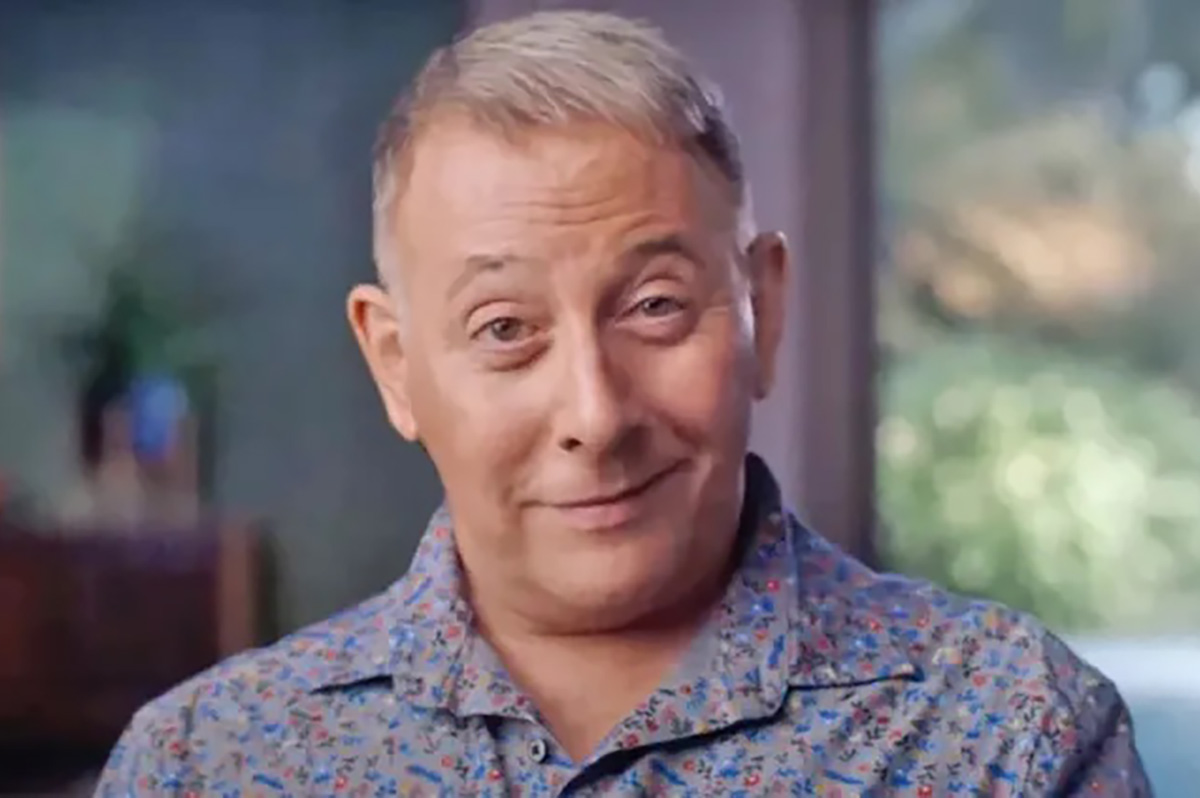
While Paul Reubens never publicly came out as gay before passing away in 2023, the two-part documentary “Pee-wee as Himself” premiered back in May on HBO Max, giving the legendary comedian a chance to posthumously open up to the world. Directed by Matt Wolf, the documentary explores how Reubens found his alter ego Pee-Wee Herman and why he kept his private life private.
The documentary won an Emmy in the Outstanding Documentary or Nonfiction Special category and remains one of the most critically acclaimed titles of the year with a 100% Rotten Tomatoes score. Also worth noting, the National Geographic documentary Sally told the posthumous coming out story of Sally Ride through the help of her long-time partner, Tam O’Shaughnessy.
5. Lady Gaga releases ‘Mayhem’
Lady Gaga entered a new phase of her musical career with the release of Mayhem, her seventh album to date. From the frenzy-inducing pop hit Abracadabra to the memorable Bruno Mars duet featured on “Die With a Smile,” seeing Gaga return to her roots and make an album for the most die-hard of fans was especially rewarding after the underwhelming film releases of “House of Gucci” and “Joker: Folie à Deux.” Gaga has been touring with The Mayhem Ball since July, her first arena tour since 2018. She even extended her tour into 2026 with more North American dates, so the party isn’t stopping anytime soon. And Gaga is even set to make an appearance next May in “The Devil Wears Prada 2.”
4. Cynthia Erivo, Ariana Grande perform at the Oscars
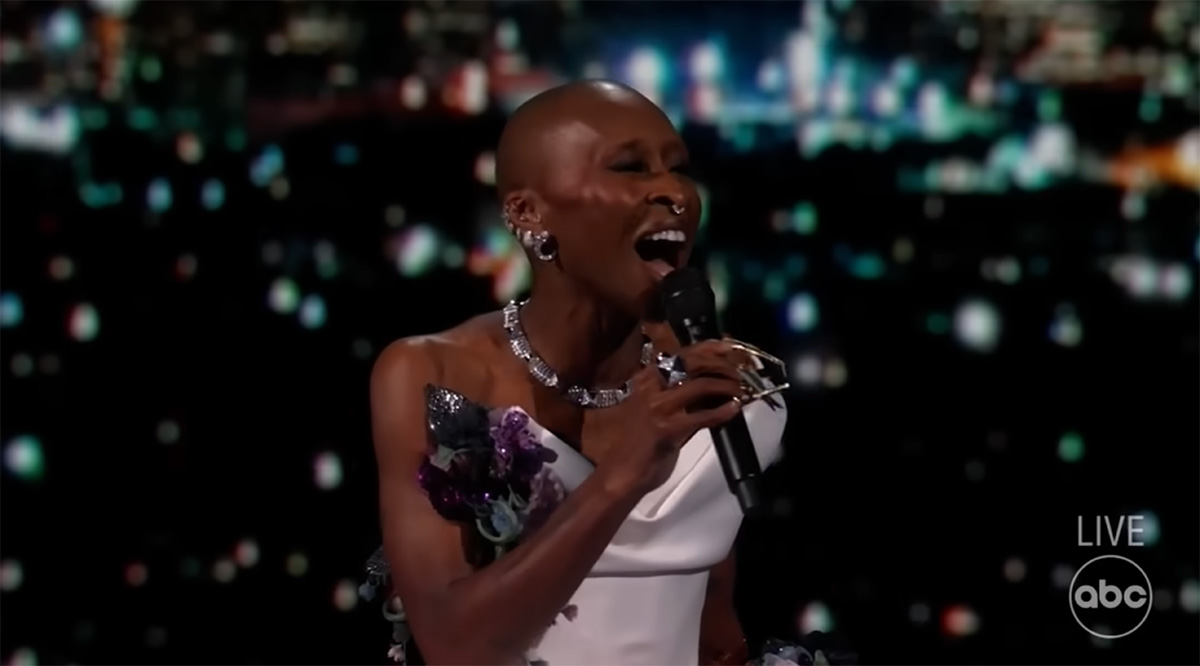
While “Wicked: For Good” didn’t quite reach the heights of the first film, we will forever have Cynthia Erivo and Ariana Grande’s breathtaking live performance that opened the 97th Academy Awards. The pair sang a rendition of “Over the Rainbow,” “Home,” and “Defying Gravity,” paying proper homage to the original 1939 “Wizard of Oz.” Even non-Wicked fans can’t deny how magical and brilliantly staged this performance was. With both Erivo and Grande up for acting Oscars last year, they’re hoping to repeat success and make history with consecutive nominations. Either way, let’s hope there’s another live performance in the making, especially with two new original songs (The Girl in the Bubble and No Place Like Home) in the mix.
3. Indya Moore speaks out against Ryan Murphy
Indya Moore has consistently used social media as a platform for activism, and in September, posted a 30-minute Instagram live speaking out against “Pose” co-creator Ryan Murphy. Moore claimed that Murphy wasn’t being a true activist for trans people. “Ryan Murphy, we need you to do more. You need to address the racism, the violence, and the targeting of people on your productions, Ryan Murphy. You do need to make sure trans people are paid equally. Yes, Janet did the right thing,” Moore said. Murphy was also back in the headlines this year for the critically panned “All’s Fair” and the controversial “Monster: The Ed Gein Story” starring Laurie Metcalf and Charlie Hunnam.
2. Cole Escola wins Tony for Best Leading Actor
Few pop culture moments this year brought us together more than Cole Escola winning a Tony award for “Oh, Mary!” the Broadway show they created, wrote and starred in (we love a triple threat!) Escola made history by becoming the first nonbinary person to win a Tony in the leading actor category, and seeing them excitedly rush to the stage wearing a Bernadette Peters-inspired gown instantly became a viral social media moment.
The cherry on top of Escola’s major moment is the recent news that they are writing a Miss Piggy movie with Jennifer Lawrence and Emma Stone producing — news that also broke the internet for the better. We cannot wait!
1. Jonathan Bailey makes gay history as ‘Sexiest Man Alive’
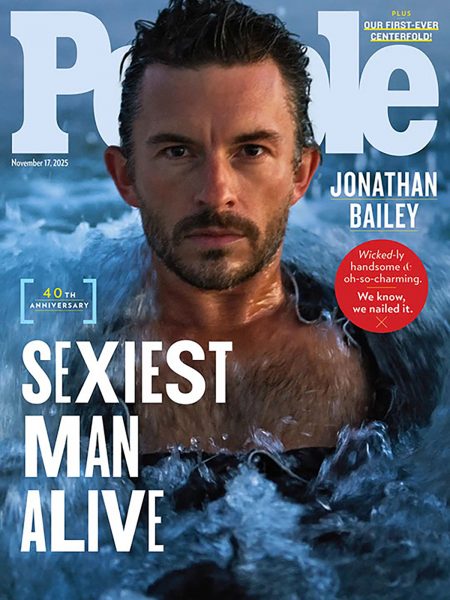
The same year as his on-screen roles in blockbusters “Jurassic World Rebirth” and “Wicked: For Good,” Jonathan Bailey made history as the first openly gay man to be named People magazine’s “Sexiest Man Alive.” The fact that it took 40 years for an openly gay man to earn the title is a signifier of how far we still have to go with queer representation, and seeing Bailey celebrated is just one small step in the right direction.
“There’s so many people that want to do brilliant stuff who feel like they can’t,” he told PEOPLE, “and I know the LGBT sector is under immense threat at the moment. So it’s been amazing to meet people who have the expertise and see potential that I could have only dreamed of.” In 2024, Bailey founded the charity titled The Shameless Fund, which raises money for LGBTQ+ organizations.
a&e features
Queer highlights of the 2026 Critics Choice Awards: Aunt Gladys, that ‘Heated Rivalry’ shoutout and more
Amy Madigan’s win in the supporting actress category puts her in serious contention to win the Oscar for ‘Weapons’
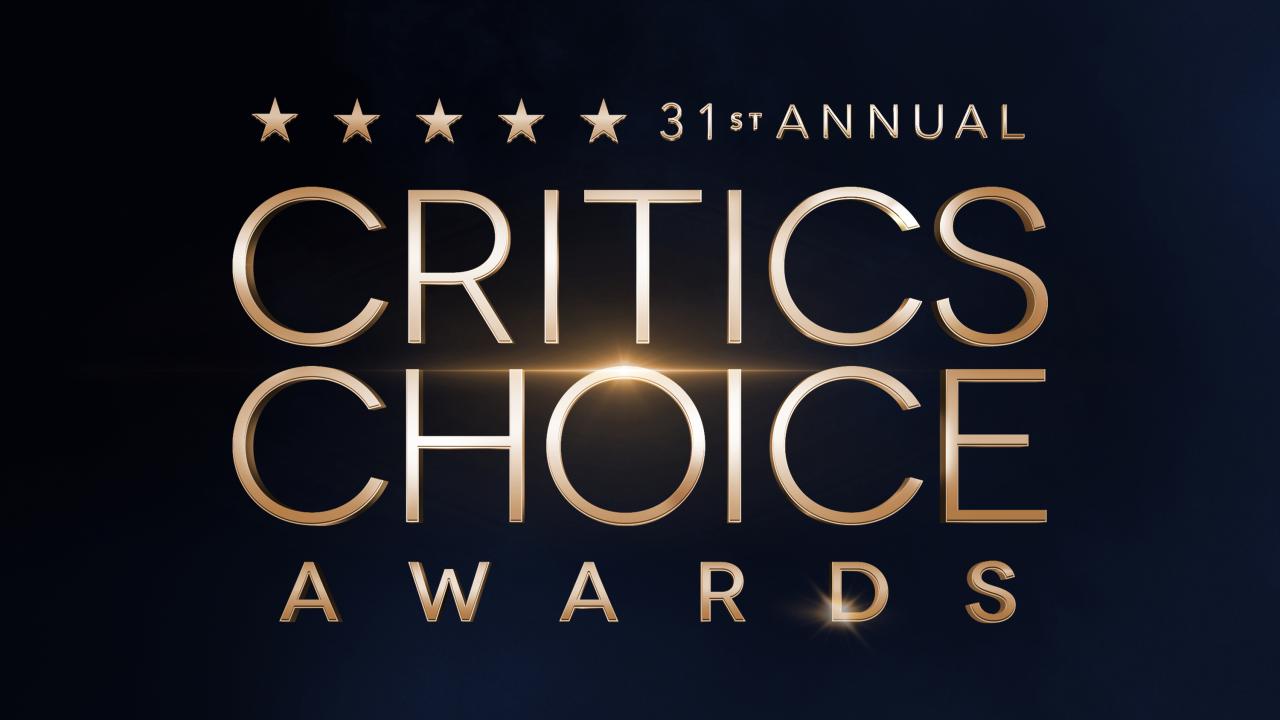
From Chelsea Handler shouting out Heated Rivalry in her opening monologue to Amy Madigan proving that horror performances can (and should) be taken seriously, the Critics Choice Awards provided plenty of iconic moments for queer movie fans to celebrate on the long road to Oscar night.
Handler kicked off the ceremony by recapping the biggest moments in pop culture last year, from Wicked: For Good to Sinners. She also made room to joke about the surprise hit TV sensation on everyone’s minds: “Shoutout to Heated Rivalry. Everyone loves it! Gay men love it, women love it, straight men who say they aren’t gay but work out at Equinox love it!”
The back-to-back wins for Jacob Elordi in Frankenstein and Amy Madigan in Weapons are notable, given the horror bias that awards voters typically have. Aunt Gladys instantly became a pop culture phenomenon within the LGBTQ+ community when Zach Cregger’s hit horror comedy released in August, but the thought that Madigan could be a serious awards contender for such a fun, out-there performance seemed improbable to most months ago. Now, considering the sheer amount of critics’ attention she’s received over the past month, there’s no denying she’s in the running for the Oscar.
“I really wasn’t expecting all of this because I thought people would like the movie, and I thought people would dig Gladys, but you love Gladys! I mean, it’s crazy,” Madigan said during her acceptance speech. “I get [sent] makeup tutorials and paintings. I even got one weird thing about how she’s a sex icon also, which I didn’t go too deep into that one.”
Over on the TV side, Rhea Seehorn won in the incredibly competitive best actress in a drama series category for her acclaimed performance as Carol in Pluribus, beating out the likes of Emmy winner Britt Lower for Severance, Carrie Coon for The White Lotus, and Bella Ramsey for The Last of Us. Pluribus, which was created by Breaking Bad’s showrunner Vince Gilligan, has been celebrated by audiences for its rich exploration of queer trauma and conversion therapy.
Jean Smart was Hack’s only win of the night, as Hannah Einbinder couldn’t repeat her Emmy victory in the supporting actress in a comedy series category against Janelle James, who nabbed a trophy for Abbott Elementary. Hacks lost the best comedy series award to The Studio, as it did at the Emmys in September. And in the limited series category, Erin Doherty repeated her Emmy success in supporting actress, joining in yet another Adolescence awards sweep.
As Oscar fans speculate on what these Critics Choice wins mean for future ceremonies, we have next week’s Golden Globes ceremony to look forward to on Jan. 11.
a&e features
Indya Moore on history-making Gotham Award nomination and speaking out on social media: “It has complicated my access to work”
The Pose star also recalls first stepping into the role of Angel during Trump’s presidency
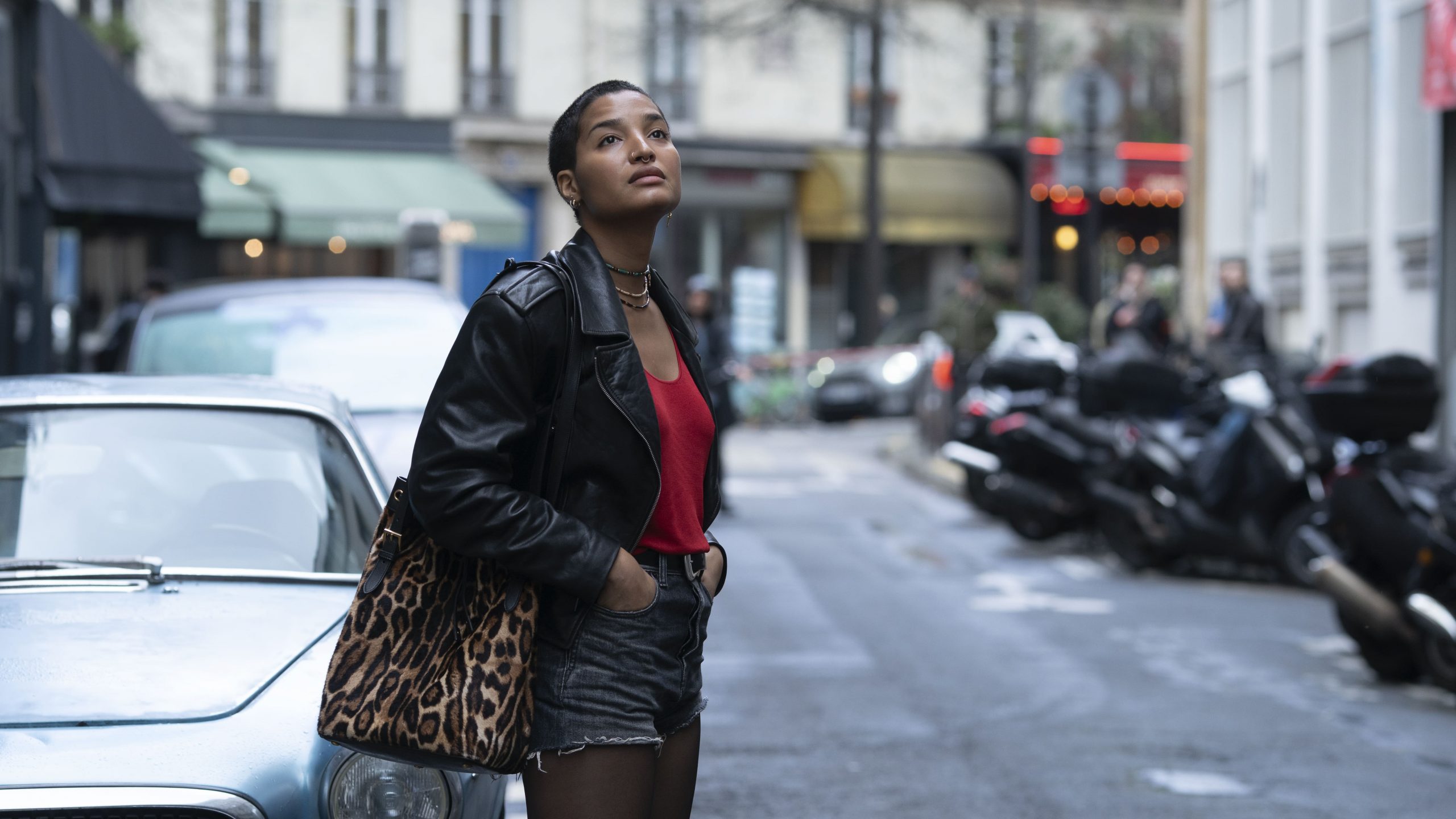
Since their breakthrough role in Ryan Murphy’s Pose, Indya Moore has been no stranger to making history both on the big screen and off it. Most recently, they became the first openly trans or non-binary actor to be nominated at the Gotham Awards in the lead or supporting categories.
“It happened because I had the opportunity,” Moore says of being recognized for their work in Jim Jarmusch’s newest indie, Father Mother Sister Brother. “It’s hard for me to receive the award of a nomination, but I really do appreciate it. It makes me feel like I’m growing in the right direction. It’s a very positive nod to keep working the way I did for this film.”
Jarmusch’s Father Mother Sister Brother, which won the top award at this year’s Venice Film Festival and is being distributed in the U.S. by MUBI (who released The Substance last year), is divided into three distinct chapters, exploring dysfunctional family dynamics. Moore appears in the last chapter, titled Sister Brother, alongside Luka Sabbat. The two play twins who reunite following the death of their parents, and must figure out how to move forward in their lives. The previous chapters feature Cate Blanchett, Adam Driver, Charlotte Rampling, Tom Waits, and Vicky Krieps.
Ahead of the film’s Christmas Eve release, Moore spoke with The Blade about working with Jarmusch for the first time on Father Mother Sister Brother, making history at the Gotham Awards, and why they remain active on social media and speak out about worldwide issues despite it complicating their “access to work.” This interview has been edited and condensed.
This film is your first with Jim Jarmusch. I’m curious how familiar you were with his work before, and how you got involved with the film?
I received an email about it, and then we spoke about it on the phone. It was really beautiful to be imagined as Skye and envisioned in the life of a character who is experiencing an aspect of being alive and being human that isn’t about persecution or hurt. I thought that was beautiful. These are the sorts of tones that I appreciate working with, the depths I always hope to find in this work. And I found that with Jim. I’m grateful it was him and that he chose me. I don’t know if it was even a choice for him because the way that he describes it is that these characters existed in his mind as me and Luka [Sabbat].
You appear after the first two chapters (titled Father and Mother), and the relationships between the characters there are much more strained and awkward, often comedically so. I love the tenderness Skye has with Billy in that final chapter. Could you speak to how the sibling relationship ties thematically into the film overall?
There is an interesting dynamic where it seems like the characters are different versions of each other — the parents and the siblings. And in each vignette, Skye is probably a mixture of all the previous siblings. And Billy is like the previous brother in a way. And also, the masking that the other characters seem to do is why the relationships all feel strained. They’re all hiding from each other, but they all love each other at the same time. They still all want to be there with each other, and it’s a really beautiful tension.
In the relationship between my character and Billy, there is more comfort in being together and seeing each other again — a gleefulness and joy that comes with being reunited. But the circumstances it happens with are overwhelmed with grief. Their relationship doesn’t seem that they’re masking. Like we see that Billy is experimenting with mushrooms, and so is Skye. The very nature of these medicines is to unmask. And so it’s a different perspective on what’s possible when people love and accept each other for who they are.
That’s really beautifully said. I don’t know if this is an explicitly queer film, but I think queer people might find unique connections with the dysfunctional family dynamics and how difficult that can be. As an openly queer person, are there ways you were able to specifically tap into some of the themes?
I think it’s very reflective of family dysfunction. Whether your kid is queer or just different in some funky, wacky way — kind of like Vicky Krieps’ character was. There’s always something about a person that others justify being cruel to and dominating, especially in sibling relationships. It’s really messed up. When we don’t learn to do that as kids with each other as siblings, we do that to each other as adults and become really oppressive people. We don’t understand other people’s autonomy and dignity, and it turns into all kinds of mistreatment and potentially persecution if you become somebody in a position of power and authority. Family is a really powerful opportunity for us to figure out who we’re going to be out in the world. We’re born to strangers, we’re born to random people, and end up having random siblings.
When you request that someone present their authentic self, you trust and believe them when they do. That should be synonymous with believing people when they tell you they’re queer, or they have a disability that they need to make boundaries around. Or if they’re a person of color, they come from a history of intergenerational trauma and persecution and genocide. How do you respond to that? Or someone else who may be part of a people who are being occupied and colonized right now. Without all these fancy political words, how do we empathize with people who are trying to survive cruelty? How do we find the wisdom and incentive to love people when you get nothing back in return for doing it? That is what the advancement and hard work actually is. In Father Mother Sister Brother, the narrative doesn’t get that deep, but it evokes that train of thought. It evokes that framework of thinking about relationships, and I appreciate the film for doing that.

This film won the Golden Lion at this year’s Venice Film Festival, and you recently made history at the Gotham Awards as the first openly trans nominee in the supporting or lead acting categories (Jack Haven was nominated for I Saw the TV Glow before they came out). What does that recognition mean to you?
Oh, well, that’s news to me. I didn’t know that I was the first trans nominee. I appreciate that acknowledgement. It happened because I had the opportunity. I don’t know how to think about it. It’s hard for me to receive the nomination, but I really do appreciate it. It makes me feel like I’m growing in the right direction. It’s a very positive nod to keep working the way I did for this film.
This year, you were also featured in Ponyboi, a great indie film that was notable for having a lead intersex character. What was your experience on that film? I wish it were getting more attention.
River Gallo is one of the most beloved people in my life. I love them so much, and I’m so proud. They wrote the film, sent it out, and got it made. That is phenomenal to me. They’re so brilliant, so loving, kind, generous, funny. Funny, oh my god! I had so much fun working with them. It was really fun to step into the complexity of my character, Charlie. She brought a meanness that does exist in some subcultures of the trans community. I loved supporting River and telling this story.
Talking about the state of the queer community and the world we’re living in, you have used social media as a real platform. Not just with what’s happening in the U.S., but Palestine and so many other issues. How do you approach using social media, especially as you’re getting more accolades and awards attention?
I know that it has complicated my access to work. It’s not incentivizing to go against the grain of this political suffocation that is taking everybody — children, women, trans and queer people, brown people, indigenous folks, and so many folks all over the world. There is an ushering in of some new world, some order that seems to be leaving behind a lot of suffering. Insurmountable suffering that we’ve never seen before. Nothing good comes out of that. Nothing good comes out of that ever. Nothing good comes out of separating people’s families. Nothing good comes out of lying to justify the exercise of power to do that. To cause suffering and terror, and then to call people who ask and demand for it to stop “terrorists.” I never imagined that we would live in a time where unarmed civilians are being called “terrorists” and are not allowed to fight against people who are hurting them, who are taking their homes and shelter and land, who are refusing to give up their only homes. Just for refusing to go homeless so that other people can have multiple homes and more wealth. What the fuck is that shit? Excuse my language. In the name of God, what are we looking at?
I stepped into the role of Angel in Pose during Donald Trump’s presidency [in 2018]. I have not had an opportunity to just be an artist who isn’t also having to take the extra step in engaging my audience that is unaffected with my audience that is. That is what my work has been. That is what I think the role of an artist is — to engage people with other people through your work. However, that instrument manifests as, be it a voice, a platform, or a creative medium. Being trans, being a person of color, and also feeling the weight of responsibility is deep work. And also being human. I have to use my platform to be a reminder of principles of how to treat each other, and also make sure that I’m maintaining that in my own life. And that’s hard. I’ve made mistakes too. When you have a platform, people romanticize you as a better version of themselves. They idolize you. So I’m constantly telling people to stop calling me a goddess. I’m not a queen. I’m a person just like you.
Truly, empathy is evolutionary, and we cannot replace it with machines. It’s not going to work, and we keep trying. And that’s why I’m trying to use my platform the best way that I can. I haven’t been as creative in my messaging; I’ve just been very direct and straight to it. I’m not even necessarily trying to be the voice for everything, but also sharing other people’s. But it’s exhausting. And now to be under the pressure of the anti-trans and anti-free speech stuff that is happening. If you don’t have a platform, you have a life. And that’s enough.
a&e features
Allison Reese’s advice? Take your comedic medicine.
Influencer, writer, comedian, and producer Allison Reese talks about the power of comedy, the news cycle, and her relationship with Kamala Harris.
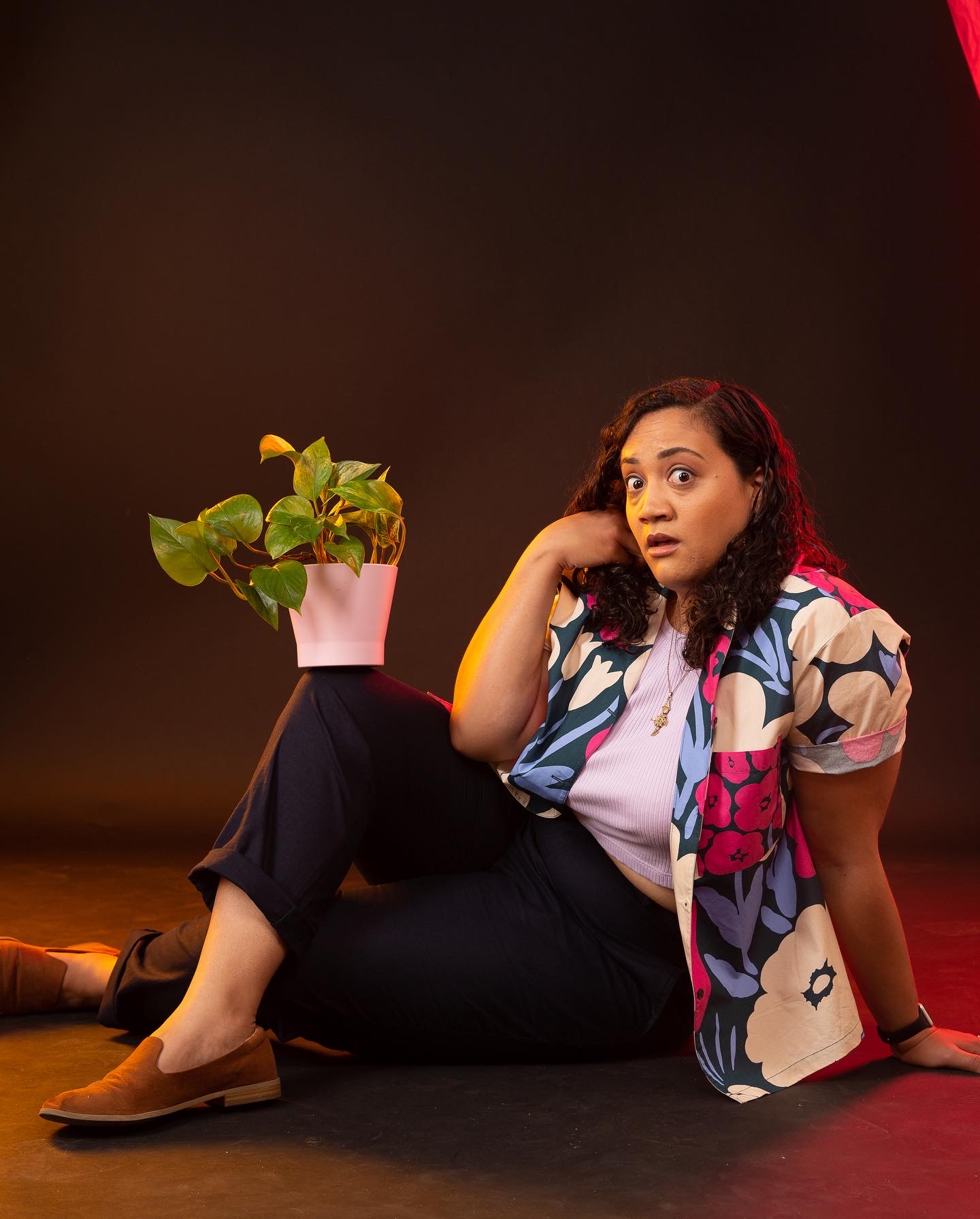
It’s often said that laughter is the best medicine. Comedian, writer, and producer Allison Reese reflects this as she has been helping her audience cope with the news cycle for years by doing various impressions of Kamala Harris on social media (which have received over 6 million likes on TikTok), through her past experiences on late-night television, and her stage appearances.
Allison has seen the positive impact of her videos and reflected on why she felt like so many people, especially those in the queer community, resonated with them. Allison shared with the Blade, “I like to think of it if I’m doing my Kamala impression, it’s like Kamala drag almost. It’s not so much just a character I do.”
Satire is something that many are using not only to digest the world around them, but it has also become a way for many to digest their news. Some people feel that the Last Week Tonight show is journalism despite John Oliver saying otherwise.
Allison stated, “As a comedian, it’s chemistry in a way. It’s like you have to have sugar to help the medicine go down, but you have to calculate how much sugar to how much medicine. Sometimes you need more medicine and a little bit of sugar. Sometimes you need a lot of sugar, because the medicine is so tough to swallow.”
While late-night shows still continue to pull in viewers, the dynamic of who people are listening to and watching is changing.
Late night is dominated by straight white men, with the exception of The Daily Show. Within the last year, late night programming has faced uncertainty with shows either being canceled or pulled off the air for a period of time.
The demand for more short-form content will continue to grow.
Allison shared, “I think the future of late night is going to be on social media. I think it’s not going to be peddled by these monolithic corporations to say, ‘Oh, you’re the right type of white guy to give me my jokey news’, you know?”
However, regardless of what the future holds, people will most likely find ways to remain optimistic when faced with tough information.
Allison understands this. Before moving to LA, she lived in New York during the middle of the pandemic and experienced the process of watching the city revive itself. “It ended up being really lovely doing stuff there as that city kind of woke up.”
One way that Allison plans on continuing to make us laugh is through releasing her new mockumentary-style web series, LGBT IDK, coming out in 2026.
Allison stated, “It follows me as I navigate the chaos of queer dating after a divorce. It’s fully improvised, and I am set up on these blind dates by my friend. And I get to date, and it’s just me with somebody who’s playing a larger-than-life comedic character.”
You can find it on her YouTube channel.
a&e features
“I should have been there”: A queer Korean adoptee finds healing with original family members
‘Between Goodbyes’ director Jota Mun talks about their filmmaking ethos behind this layered, moving portrait, now streaming on PBS.
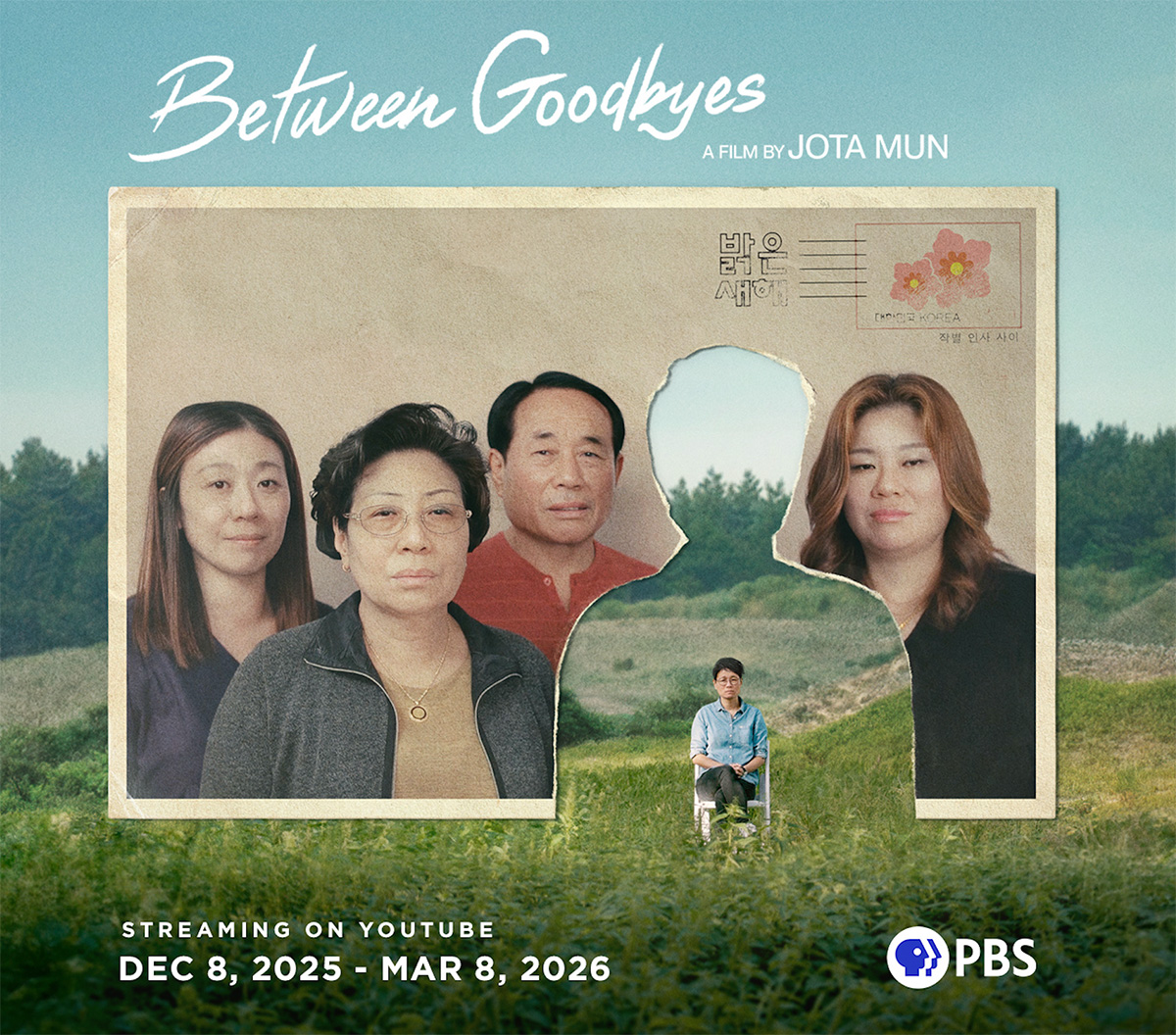
What does longing for your child look like? What happens when they resurface in front of you, when that rift was once an immeasurable open sea — a searing pain that silently hollowed you out for decades? For the child wrenched away by circumstance and thrown into the purgatory of always feeling in-between: in between home, in between being a whole person, in between who you could have been and who you are now — what does it mean to become and belong?
In filmmaker Jota Mun’s documentary Between Goodbyes, the fragmented yearning for home, family and identity are woven together into a tremendous and at times dream-like contemplation of the self, focused on various family members set adrift by a deceitful international adoption machine.
The story is focused on Mieke Murkes, a queer Korean adoptee who grew up in the rural village of Vaassen in the Netherlands. Shortly after her birth in 1982, she was raised by Willy, a devout evangelical Christian woman. But the story does not begin with Mieke in Vaassen. It begins with Okgyun, her original mother, walking through an ephemeral meadow as she makes her way to a shoreline. This is our first point of loss.
It is important to understand how the stories of Okgyun and Mieke exist. In Between Goodbyes, we see a frustrating glimpse into the cultural and political forces that created this separation. Since 1955, 200,000 children have been adopted from South Korea, and just three years ago, several of these adoptees found that their documents had been falsified. Murkes would sift through her own papers in Between Goodbyes, noting their dull and rote descriptions of her physical appearance and health. “The paperwork is as if you’re buying a new car,” Murkes says.
Written nearby: “Both parents are unknown,” a falsehood that leaves the family breathless. It is a gut punch.
This March, a South Korean governmental agency admitted that it had violated the rights of adoptees, but an investigation that began in 2022 at the behest of over 350 Korean adoptees has been halted. Whether or not retribution can ever be paid is up in the air, but the reeling grief and complicated self-reckoning many of these adoptees and their families face are rendered and expressed with deep tenderness in Mun’s documentary. “I did not know how to fit the Korean part of me in there,” Murkes said.
When Okgyun was pregnant with Mieke, she was also raising three other daughters: Mijin, Mikyung and Taekyung. The population was booming, and mothers like herself were being shamed for continuing to have children. Considering abortion, Okgyun recounts a midwife who convinced her not to go through with it — that if the child were a boy, she should keep him. If it turned out to be a girl, she could give her away to live “a good life” in the U.S. “Men are always positioned above women,” Okgyun said. “I always hated that.”
After Mieke was born, Okgyun’s mother-in-law told her to give her away. “She was gone before I saw her face,” Okgyun said. “I let her go.” Her guilt tightens her throat, trembles in her voice. “I dreamed of Mieke a lot. I can’t tell you how many times,” Okgyun said. “Dreaming and forgetting, dreaming and forgetting. The thought that kept me going is that one day I can find Mieke.”
What ensued was a several years-long search. Kwangho, Mieke’s original father, pleaded with an adoption agency for any leads about Mieke. They denied him several times and his desperation only grew. “I had to find her to be at peace before I die,” he said.
Meanwhile, Mieke’s own grief and confusion were compounding. When she was beginning to discover her queerness, she was deeply ingrained in local religious spaces. What made her feel free, the church treated as an aberration — as behavior that resulted from loss.
When she would eventually meet her original family, they, too, had trouble processing her queer identity and masculine presentation. To them, queerness was “acquired” from being raised in a foreign land. With time, they grew to embrace Mieke and her partner, Marit, even as misunderstandings arose. Of this, Mieke’s conflictedness is explored. Gay rights are more advanced and accepted in the Netherlands than in South Korea, but this does not mean contending with her queerness would have been easy with her adoptive mother, Willy. “It probably would have disappointed her a lot,” Mieke tearfully revealed.
Mieke’s stepping in between knowing and unknowing is reminiscent of Okgyun’s dreaming and forgetting — their grief and confusion move within them, replicating themselves over and over again. Between Goodbyes dives deeply into this in order to offer a portrait of healing: of its complications and the necessity of community support to achieve this.
Mun discusses the film with the Blade, diving into how reunification between adoptees and original family members is, in many ways, made nearly impossible by factors like language and cultural barriers enforced and held tightly in place by the international adoption system. This film illustrates a break in this narrative and the mighty efforts behind it all.
A broadcast version of Between Goodbyes is now available to stream on PBS. See below for more information.
Can you tell me about the inception of making Between Goodbyes? Have you always wanted to tell a story about international Korean adoption from a queer perspective?
As a queer Korean adoptee myself, [there are] so many intersections that I haven’t quite seen on screen before. So I was always really excited about making something about my community. And then I’d say, in 2017, is around when I started getting closer to zeroing in on the idea. I think part of it was through befriending Mieke and hearing her parents’ story. Hearing about their efforts really blew my mind.
So much of the standard narrative is that adoptees initiate the search. So even before meeting [Okgyun and Kwangho], it just felt like it spoke so loudly of not only their character, but a piece of the puzzle that I had never considered — that they could be longing for us. And I think as an adoptee, you always wonder what [your original parents] would think. So it’s very noticeable that we almost don’t ever hear from them directly. Even in narrative stories of adoption, they’re usually deleted, or they’re written in a really flat way that feels like they’re serving the plot. I’ve never seen a depiction of birth mothers in particular who are questioning their own circumstances or feel angry about it.
There’s a lot of nuance given to all of the different people that we see in the story. The pain is layered and deep, and we don’t just view it from one perspective. What was it like having to portray this hurt, when many adoption stories typically focus solely on the adoptee’s emotional and personal journey?
It’s so unique through each lens, even though it’s the same pain. Like her sisters — of course, it’s going to affect them. Even if she never said anything, they must have felt it. It just ripples out to everyone and keeps expanding.
Originally, it was focused on Mieke, because that’s who I had the most access to, and she’s the closest to me in terms of general identity markers. So in my mind, I felt more confident that I could tell her story in a nuanced way. But what about Okgyun? I was hitting a similar barrier of communication that Mieke had hit. That’s part of why our main producer, Zoe Sua Cho, was so essential in conveying more about Okygun and the original family’s side of the story.
When I was in the early stages of developing the film, there was a quote that I felt was really inspirational: “In our hurting, we did not realize that we were stolen from each other” (by SN Désirée Cha from Outsiders Within Writing on Transracial Adoption). The same quote came back to me in the edit and helped us find a narrative structure that went beyond just one person’s perspective.
What if the main character is the collective trauma, a singular event that causes the family to splinter and suffer across decades? I wanted to explore how tempting it is in these moments of righteous anger at systemic problems to end up fighting with each other. I feel like they both had to mourn something that was so much bigger than any one family. Mieke’s adoption affected so many people that I almost wanted that to be the main character. How do we not get lost in that pain and still try to come back together? It’s too much to carry alone.
So the main character is not necessarily one person, but the issue that you’re trying to tackle throughout the story. It also makes me think about how the documentary itself, or the making of it, also participates in this community healing that I feel like was the focus of Between Goodbyes.
I hope it’s an important layer. Suffice to say I think I always deflect to name a singular main character. I wanted to show everyone’s point of view while of course highlighting especially Okgyun and Mieke.
What else can you share about your approach to filmmaking?
You know, I was on this wonderful panel earlier this year, hosted by A-DOC, and I kind of surprised myself in preparing for it. I realized, actually, I have a lot of strong beliefs on filmmaking ethics that I hope come through in the film. For example, I reject the genius artist myth. The fantasy that if an artist is talented enough, they get permission to treat everyone around them terribly. That exploitation and squeezing things out of people is the best way to make great art.
Instead, I want to believe that the sensitivity, the care, and emotional work I poured in is going to come shining through in the film. And I do think that’s part of why we witnessed so many intensely vulnerable moments that I couldn’t have predicted.
This emotional connection to the film is also, visually, represented in artistic and inventive ways. There are sequences interspersed throughout that feel dream-like and cinematic. Creatively, what was it like to structure and craft how you wanted those scenes to be, the weight that they carried, and why you wanted to represent them in that way?
Aw, thanks for saying so! I was clear from the beginning that I wanted certain moments in the film to look as cinematic and epically life-changing as they feel in real life. Because visually, sometimes these moments of heartbreak can look rather dull. The deep heartbreak of a farewell at the airport. What does it look like? It looks like two people hugging in a very normal-looking terminal. But that’s not what it feels like. It feels larger than life. So to me, every single one of the art [scenes] has a very literal symbolism in my mind.
I really enjoy the complexity given to the family, both through the artistic symbolism and through the different angles we get to view them in. When it comes to Mieke’s queer identity, there are varying levels of acceptance and also tension that co-exist. One of her sisters, Mikyung, skirts around terms and labels, instead saying Mieke is “like that,” and “I don’t know anyone like that.” There was this feeling that queerness is learned or acquired elsewhere — that Mieke “wouldn’t have turned out like that” if she had grown up with her original family in Korea.
I can’t be sure what they were implying but you know, I definitely didn’t want to fall into a common trope of seeing Western values as being so liberal and accepting and framing all other cultures as homophobic. I want to be clear that there is a queer community in Seoul. It’s not the same as Amsterdam, of course, but it does exist.
That’s part of why it was important for me to include Mieke mentioned what she thinks her Dutch mom would have thought — just to clarify that homophobes are everywhere. There are plenty of them here in the West as well. Mieke’s Dutch parents were Evangelist Christians. So it’s not like everyone in the West is free to be a lesbian, you know?
Another moment that struck me in the film was a moment where we, as the audience, get to see you clearly. In this scene, we see you and Mieke on a rooftop, and you’re consoling her as she’s trying to prepare for a difficult conversation with her original mother, Okgyun. Did you have to find a balance in terms of being the director of this film and being Mieke’s friend?
It was really important to me to show friendship and how much that can help you along the journey. You think that for her to emotionally process things, it would have to be with her mom. But that rooftop conversation felt so transformative in itself. And then what ended up being the kind of mirror scene to that was Okgyun talking to Ruth [a fellow original mother]. She needed a buddy, too. How many times in life are we like: The opposing party doesn’t need to get it, but if my friend just could — that would give me so much relief and patience to enter the actual conversation with the person I’m upset with.
Being so personally close to Mieke and her family meant that my film was about all people I loved and cared about. I think the documentary field comes from such a long history of an anthropological approach. It’s like, “I’ve helicoptered in, and I just met you, but I’m the expert artist.” I wish the ethos were the opposite; we need to care about everyone, from the participants to the crew. I don’t want the blood, sweat, and tears to come through on the screen. I hope that watching it makes people feel cloaked in tenderness and care.
I was so worried about everyone, probably too much. It’s such a weird thing to ask people to do, to be in a film, so I took that with a lot of responsibility. Be aware of the impact you’re having. I am having an effect on this family’s life. I almost wanted to be like: “Forget my art project.” This is about the rest of their lives as a family, and that’s more important. So it became a light on my path, trying to make decisions as best I could to have a positive impact on their relationship.
It almost made me question my ethics in a different direction. “Am I intervening too much?” And that’s a strange thing: I have to admit I exist. I’m not a fly on the wall. And I think that’s why the conversation on the roof was really the most vulnerable for me, because I was showing myself. I’ve actually been here the whole time, cheering them on or trying to diffuse tension. I set out to make a film about how hard it is to stay in reunion, but now I’ve realized I’ll be heartbroken if their reunion doesn’t last. So in many ways the film was really just a vehicle for my attempt at keeping us all connected across so many distances, and that’s my own emotional journey or connection to their story.
Mun plans to release the full-length film in 2026, along with deleted scenes and additional footage. Up-to-date information can be found on the film’s Instagram page.
Kristie Song is a California Local News Fellow placed with the Los Angeles Blade. The California Local News Fellowship is a state-funded initiative to support and strengthen local news reporting. Learn more about it at fellowships.journalism.berkeley.edu/cafellows.
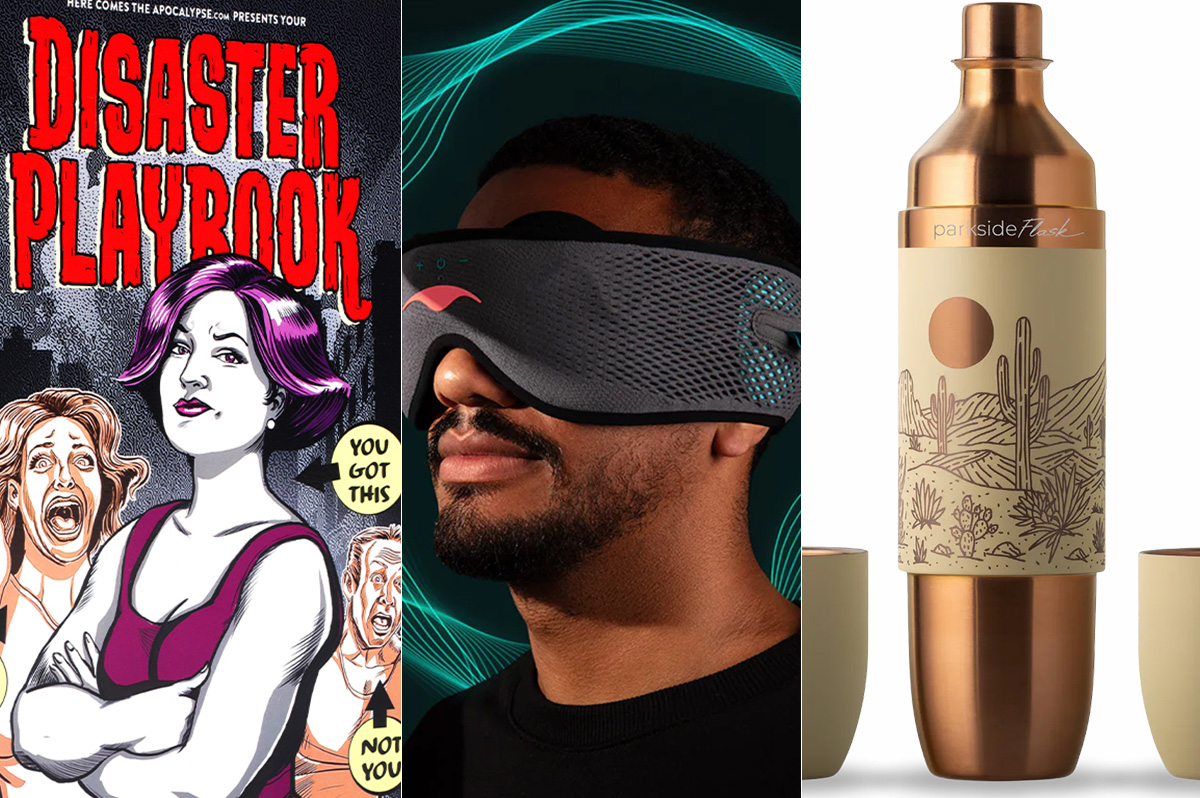
Some gifts scream practical, others whisper luxury, and a few flat-out blur the lines. From cocoa that feels ceremonial to a cologne that linger like a suggestive smirk, this year’s ultimate gift picks prove that thoughtful (and occasionally naughty) presents don’t have to be prosaic. Welcome to your holiday cheat sheet for festive tangibles that get noticed, remembered, and maybe even result in a peck of gratitude planted under the mistletoe. Consensually, of course.
Amber Glass Champagne Flutes
Pop the champs – but make it vintage. These tulip-shaped stunners in amber-tinted glass bring all the Gatsby vibes without the Jazz-age drama. Whether you’re toasting a milestone or celebrating a Tuesday, their seven-ounce capacities and hand-wash-only care make ‘em as practical as they are pretty. Pair with a thoughtful bottle of bubs and gift with a glittering wink. $18, NantucketLooms.com
Disaster Playbook by Here Comes the Apocalypse
Because the end of the world shouldn’t be a solo act, this spiral-bound guide is your step-by-step roadmap to surviving and thriving when everything else goes sideways, which might be sooner than you think. Packed with checklists, drills, and a healthy dose of humor, it’s like a survival manual written by your most prepared (and slightly snarky) friend. Whether you’re prepping for a zombie apocalypse or, more realistically, REVOLUTION!, this playbook’s got your back. $40, HereComesTheApocalypse.com
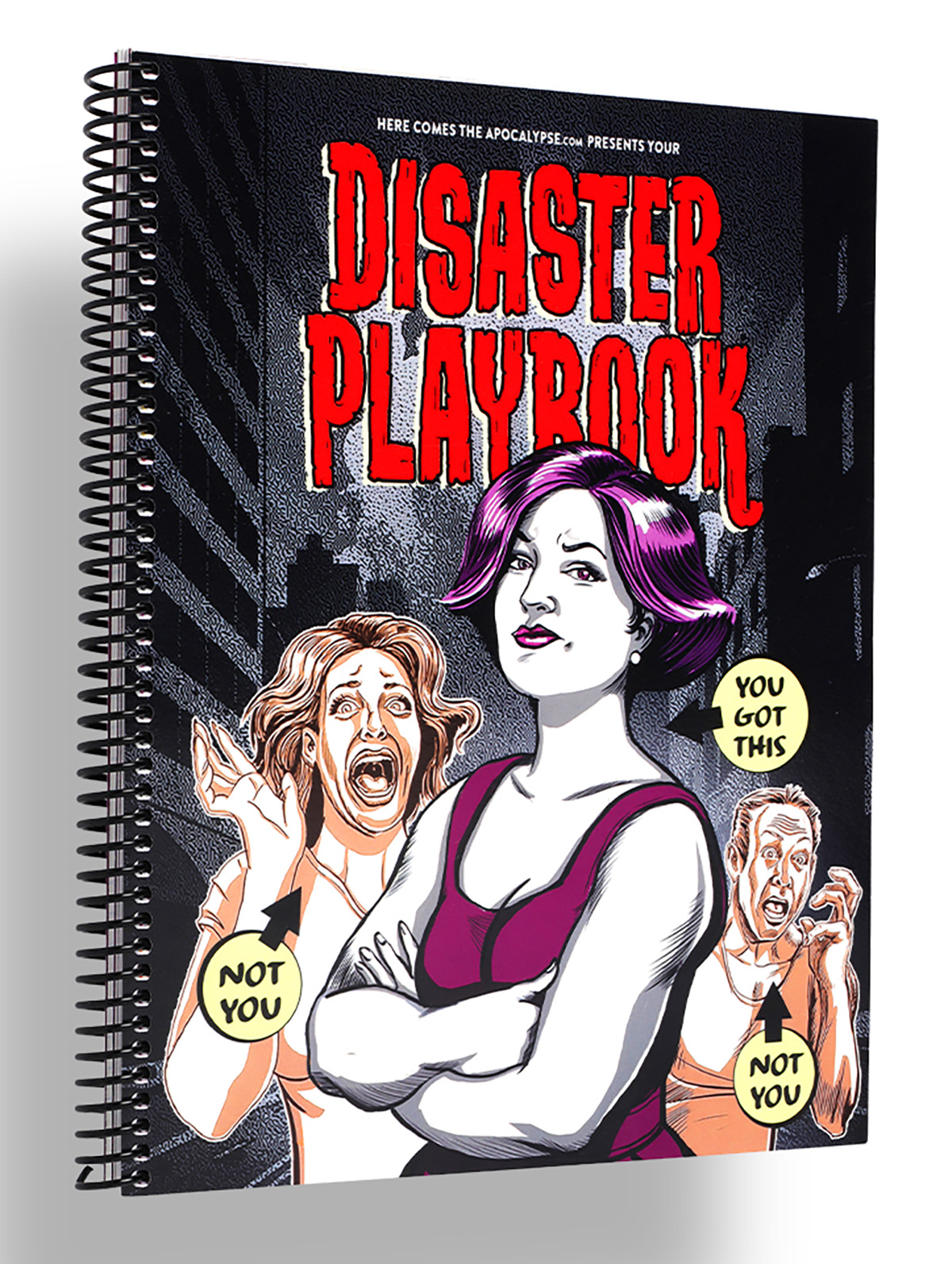
Wickless Vulva Candles
Bold, luxurious, and completely flame-free, CTOAN’s wickless candles melt from beneath on a warmer, releasing subtle, sophisticated fragrances, like sandalwood or lavender. The vulva-shaped wax adds a playful, provocative element to any space –perfect for a bedroom, living room, or anywhere you want elegance with an edge. A gift that celebrates form, intimacy and self-expression, no fire required. $39, CTOANCO.com
Villeroy & Boch Royal Classic Christmas Collection
Every meal is a mini celebration – with whimsy at every place setting – in Villeroy & Boch’s Royal Classic festive dinnerware collection that hits all the right notes. Made from premium German porcelain, it features nostalgic little toys, nutcrackers, and rocking horses in delicate relief, giving your holiday spread a playful but refined twist. Dishwasher- and microwave-safe, it’s luxe without the fuss. Gift a piece to a special someone, or start a collection they’ll use (and show off) for years to come. $22-$363, Villeroy-Boch.com
Greenworks Electric Lawnmower
You a ’hood queen who considers lawn care performance art – or just wants to rule the cul-de-sac in quiet, emission-free glory? Greenworks’ zero-turn electric mower has the muscle of a 24-horsepower gas engine but none of the fumes, drama or maintenance. Six 60V batteries and a 42-inch deck mean you can mow up to two-and-a-half acres on a single charge – then plug in, recharge, and ride again. It’s whisper-quiet, slope-ready, and smooth enough to make you wonder why you ever pushed anything besides your queer agenda. The perfect gift for the homeowner who loves sustainability, symmetry, and showing off their freshly striped yard like that fresh fade you get on Fridays. $5,000, GreenworksTools.com
Molekule Air Purifier
For the friend who treats their space like a sanctuary (or just can’t stand sneezes), the Molekule Air Pro is magic in motion. Covering up to 1,000 square feet, it doesn’t just capture allergens, VOCs, and smoke – it destroys them, leaving your air feeling luxury-clean. FDA-cleared as a Class II medical device, it’s serious science disguised as modern design. Gift it to your city-dwelling, pet-loving, candle-burning friend who likes their living room as pristine as their Instagram feed. $1,015, Molekule.com
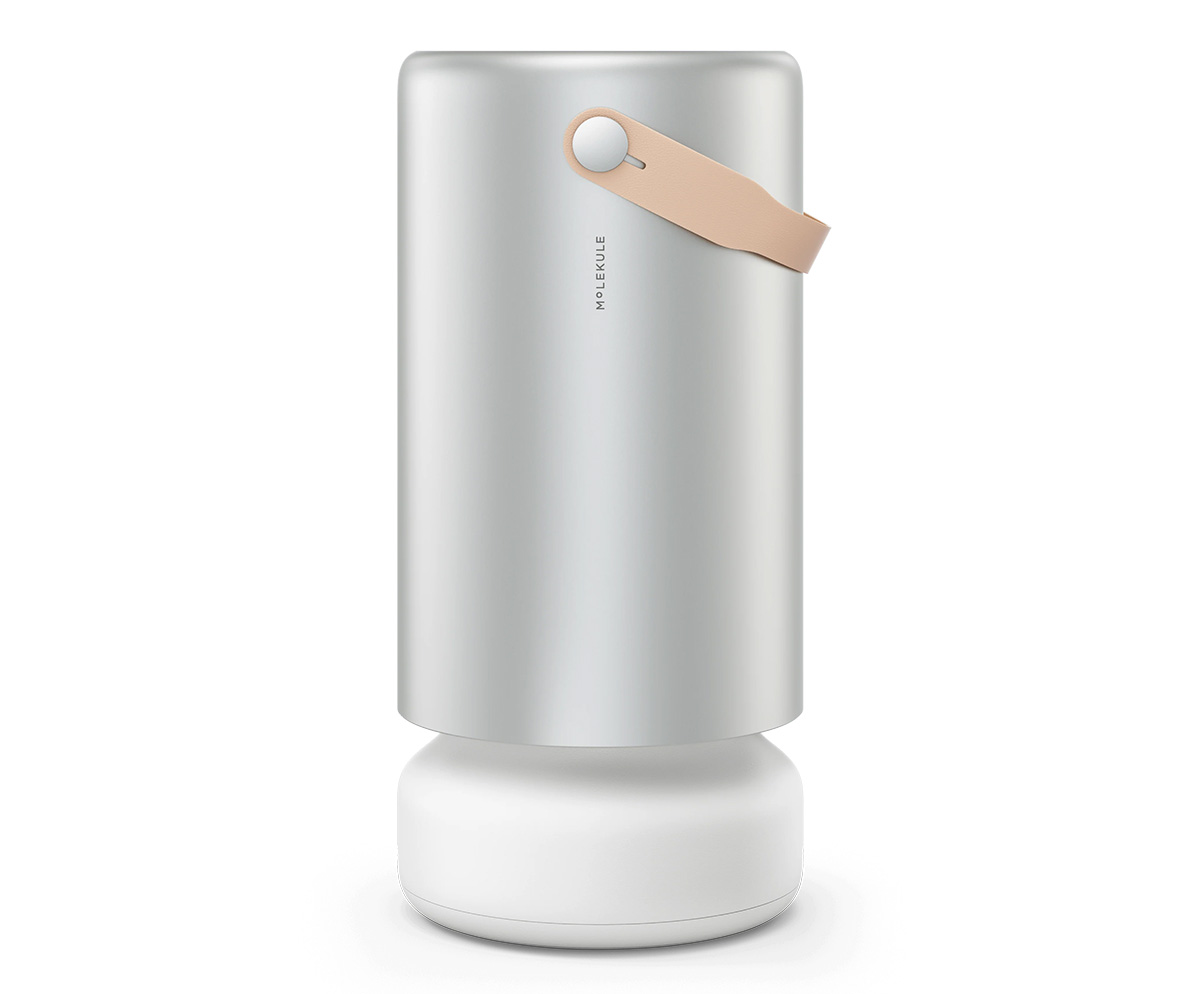
Cipriani Prosecco Gift Set
Effervescent with stone-fruit sweetness and a touch of Italian flair, the Cipriani Bellini & Prosecco gift set brings brunch-level glamour to any day of the week. The Bellini blends rich white-peach purée with sparkling wine, while the dry ’secco keeps things crisp and celebratory. Pop a bottle, pour a flute, and suddenly winter weeknights feel like a party – even with your pants off. $36, TotalWine.com
Woo(e)d Cologne
British GQ recently crowned Woo(e)d by ALTAIA the “Best Date Night Fragrance,” and honestly, they nailed it. Confident without being cocky – smoky gaïac and Atlas cedarwood grounds the room while supple leather and spicy cardamom do all the flirting – it’s a scent that lingers like good conversation and soft candlelight. Gift it to the one who always turns heads – or keep it for yourself and let them come to (and then on) you. $255, BeautyHabit.com
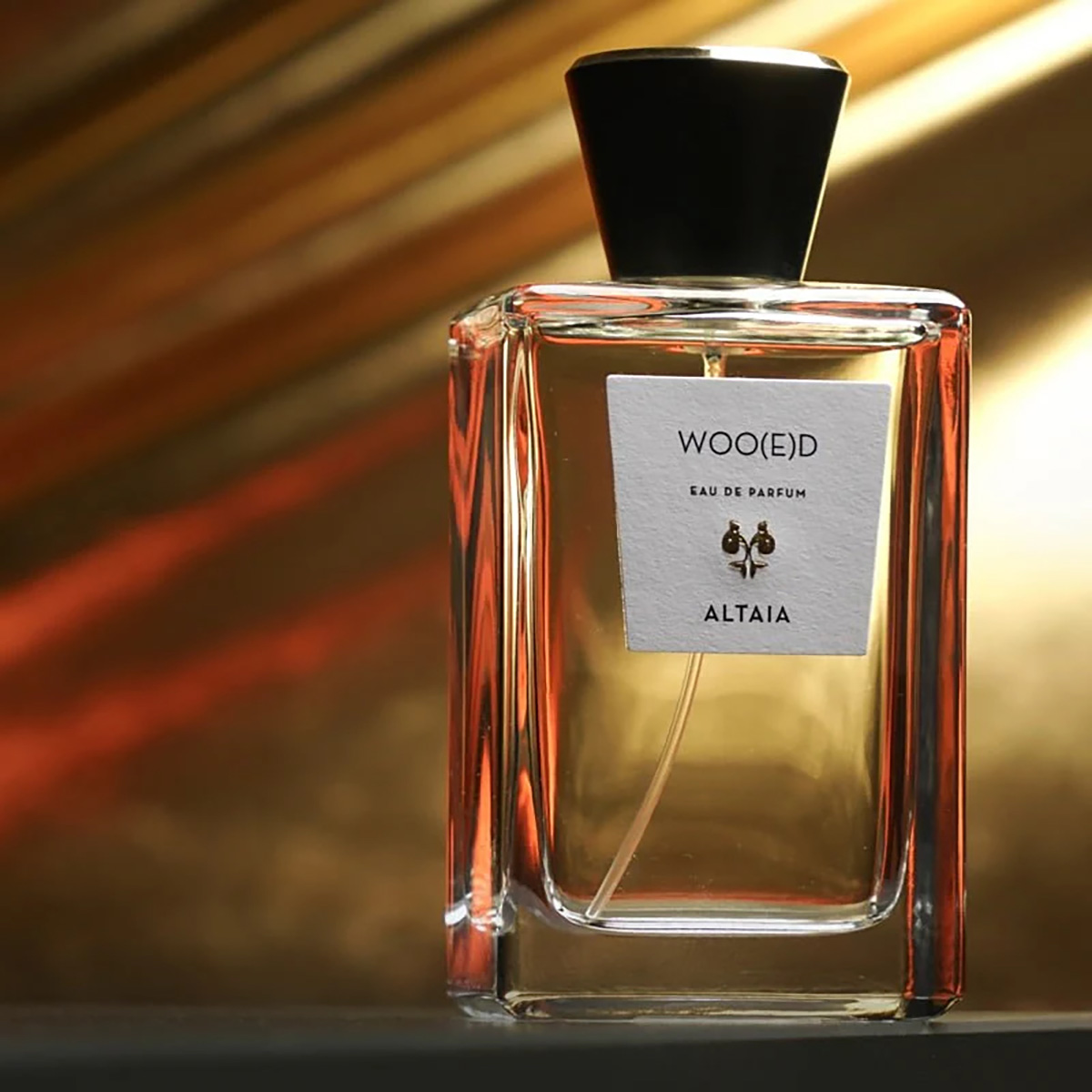
Lococo Cocoa Kit
Keep the run-of-the-mill mugs in the cabinet this Christmas and pull out Lococo’s handcrafted Oaxacan versions that demand you slow down and sip like it matters. Paired with a wooden scoop, rechargeable frother, and Lococo’s signature spice hot-chocolate blend (vegan, gluten-free, with adaptogenic mushrooms), this holiday kit turns Mexi-cocoa into a mini ritual you’ll look forward to. Perfect for anyone who loves a little indulgence with a side of ¡A huevo! energy.
Manta Sleep Mask
Total blackout, zero pressure on the eyes, and Bluetooth speakers built right into the straps, this ain’t your mama’s sleep mask — but it could be. The Manta SOUND sleep mask features C-shaped eye cups that block every hint of light while ultra-thin speakers deliver your favorite white noise, meditation, or late-night playlist straight to your ears. With 24-hour battery life, breathable fabric, and easy-to-adjust sound, it turns any bed (or airplane seat)

Shacklelock Necklace
Turn the industrial-chic vibe of a shackle into a sleek statement. Mi Tesoro’s platinum-plated stainless-steel necklace sits on an 18-inch wheat chain, featuring a shackle-style latch pendant that’s waterproof, tarnish-free, and totally fuss-les. Beyond style, it nods to a classic gesture in the queer leather community: replacing a traditional Master lock with something elegant to quietly signal belonging to someone special. Wear it solo for a minimalist edge or layer it like you mean it; either way this piece locks in both your look and your intentions. $90, MiTesoroJewelry.com
Parkside Flask Mojave Edition
Wine nights get a desert glow-up with Parkside’s limited-edition 750-milliliter all-in-one flask draped in sun-washed bronze and badland hues like sage, sand, and terracotta – with magnetic stemless tumblers that snap on for effortless shareability. It keeps your vino chilled for 24 hours, pours without drips (no tears for spilled rosé, please), and even let
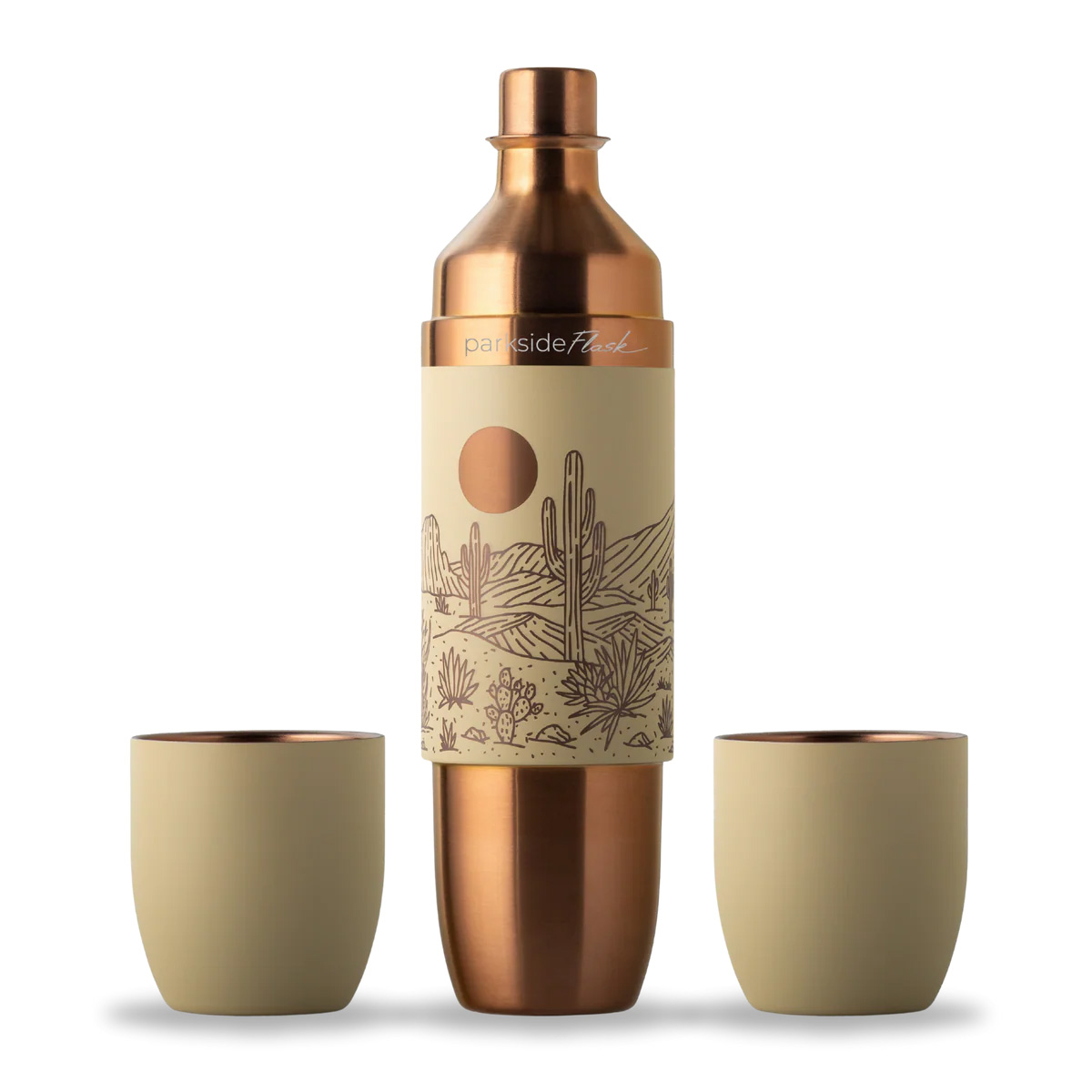
Mikey Rox is an award-winning journalist and LGBT lifestyle expert whose work has published in more than 100 outlets across the world. Connect with him on Instagram @mikeyroxtravels.
a&e features
Drag queen Kennedy Davenport dishes on her new comedy special
The RuPaul’s Drag Race alumni on The Kennedy Davenport Center Honors and how she chooses to stay positive amidst so much hate.

While RuPaul’s Drag Race is filled with legendary queens, few have had as much of a cultural impact as Dallas’ very own Kennedy Davenport. Originally from this seminal program’s seventh season, the performer became an instant fan-favorite with her endless stream of quotable catchphrases and jaw-dropping dance ability. With follow-up appearances on All Stars and Versus The World, Kennedy has solidified herself as one of the biggest icons to come from this franchise. And, finally, World of Wonder is giving her the solo spotlight she deserves with a new special, unlike anything the production company has done before: The Kennedy Davenport Center Honors.
“It’s different, and that’s why I wanted to do it!” Said Davenport, when she sat down with the Los Angeles Blade to discuss what drew her to this new special. “I’m a host by nature — and coming up in the Drag Community, you have to know how to hold a mic.”
The Kennedy Davenport Center Honors will see the queen bestow awards — or, as she calls them, ‘dishonors’ — to various Drag Race alumni. From “Proud Drag Mother Award – When Your Daughter Has A Higher Booking Fee” to “The Struggle is Real Award,” Kennedy was excited to share the stage with some of her favorite Drag sisters and completely gag them with these hilarious new titles. Whether it be recent icon Bosco or long-lasting legends like Alexis Mateo, she assures everyone reading that this VIP list will be one of WowPresentsPlus’ most stacked yet. But beyond the comically star-studded glamour, Kennedy knew that she wanted her first special to be something more than just an award show. She wanted to use this time to uplift and celebrate the Drag community that she loves so much — a practice that queer people have been missing in recent months, but that this Queen does in her life every single day.
“[I’m positive] on a daily basis,” Kennedy explained, when discussing the optimistic attitude she embodies as a host. “I always highlight positivity. And, you know, it’s cliché to say…but I really don’t think about the negative. In my life, or in my career.” It’s a part of the performer that fans don’t often get to see; between the verbal takedowns and stunning lip-syncs, Drag Race watchers can miss how Kennedy is constantly supporting everyone around her.
When discussing how she manages to stay so hopeful, especially when coming from a state filled with anti-LGBTQ+ rhetoric, Kennedy clarified, “It’s a very conscious thing. You have to be aware of what you are putting into the universe, and what you are allowing into your personal space.” She continued, “It’s easy for me to do [this] because I’ve been down at the bottom [of life]. I’ve [also] been at the top, but the bottom is where you really start learning life and start making up your mind about wanting to live positively.”
“I’m going to see my dream, I’m going to see my purpose. I’m going to encourage others and motivate them to be their authentic selves — and I’m going to respect myself along the way so that I can continue to be respected and loved by [everyone around me.]” It’s a radically optimistic mindset that audiences don’t often get to see through the television screen. And it’s one that Kennedy knows her fans can benefit from, now more than ever.
During a time when LGBTQ+ communities — especially drag queens, who are go-to scapegoats for conservative fearmongers — are being attacked at a daunting scale, it’s becoming harder and harder to find moments of pure queer joy in America. It’s understandable that so many are focused on pushing for change in all arenas of this country, but we can’t forget how essential community is in the ongoing fight for liberation. It’s good to remember that in the face of discriminatory rhetoric, LGBTQ+ joy is a radical act, which is why Kennedy is hoping that this special will give viewers something they haven’t had in far too long: a moment to relax.
“It’s all [done] in love, and that’s the message that I really want people to see, that,” said Davenport, when discussing how excited she is to not only poke fun at her fellow performers, but spotlight their many accomplishments. “It’s a ‘dishonors,’ but we all love them, and everybody that I call out [in the special] knows that it’s done in love.” By bringing viewers into her close relationships with everyone involved, Kennedy is inviting them to laugh at the inside jokes she’s developed over years of knowing these stars. It’s the most exciting part of the entire endeavor for the Queen, saying, “I’ve always lived with the heart of love and laughter. So, to have this platform, to be able to spread love…it’s a blessing in disguise.” This interview quickly turned from a spotlight on a funny special into a profile on a Drag Queen who has helped so many over the years. It’s all a part of Kennedy Davenport’s ongoing mission to spread her personal mindset of love and life to everyone she meets, with The Kennedy Davenport Center Honors becoming her latest and biggest attempt at uplifting the many people in her community. This is why, as the interview came to an end, Kennedy clarified her true goal with this special: “At the end of the day, I just want you to be sitting back laughing and saying, ‘That made me sick!’ She talked about me, and I loved it.”
The Kennedy Davenport Center Honors premieres December 7th on WOW Presents Plus
-
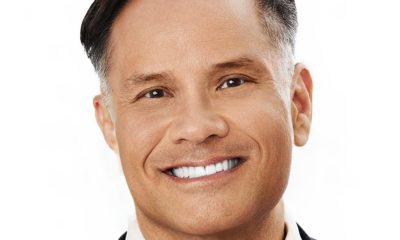
 Los Angeles2 days ago
Los Angeles2 days agoUCLA’s long-standing LGBTQ+ alumni organization welcomes new president
-
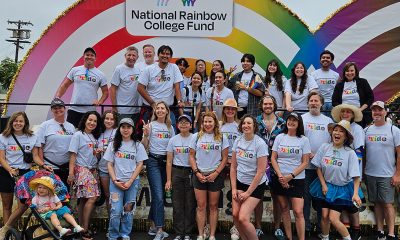
 LGBTQ+ Youth Mental Health3 days ago
LGBTQ+ Youth Mental Health3 days agoThe National Rainbow College Fund will grant $2,500 to 200 LGBTQ+ students: out or not
-
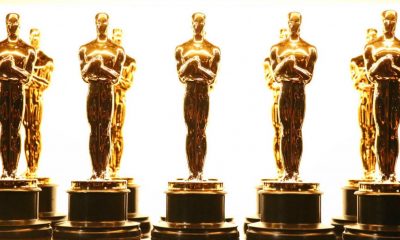
 Movies3 days ago
Movies3 days agoFew openly queer nominees land Oscar nominations as ‘Sinners’ and ‘One Battle After Another’ lead the pack
-

 Movies1 day ago
Movies1 day agoA ‘Battle’ we can’t avoid
-

 a&e features5 hours ago
a&e features5 hours agoWriting her own story arc: Stuntwoman Ellie Haigh takes on Hollywood

